«We’re all neighbors now. No, not neighbors. FAMILY.»
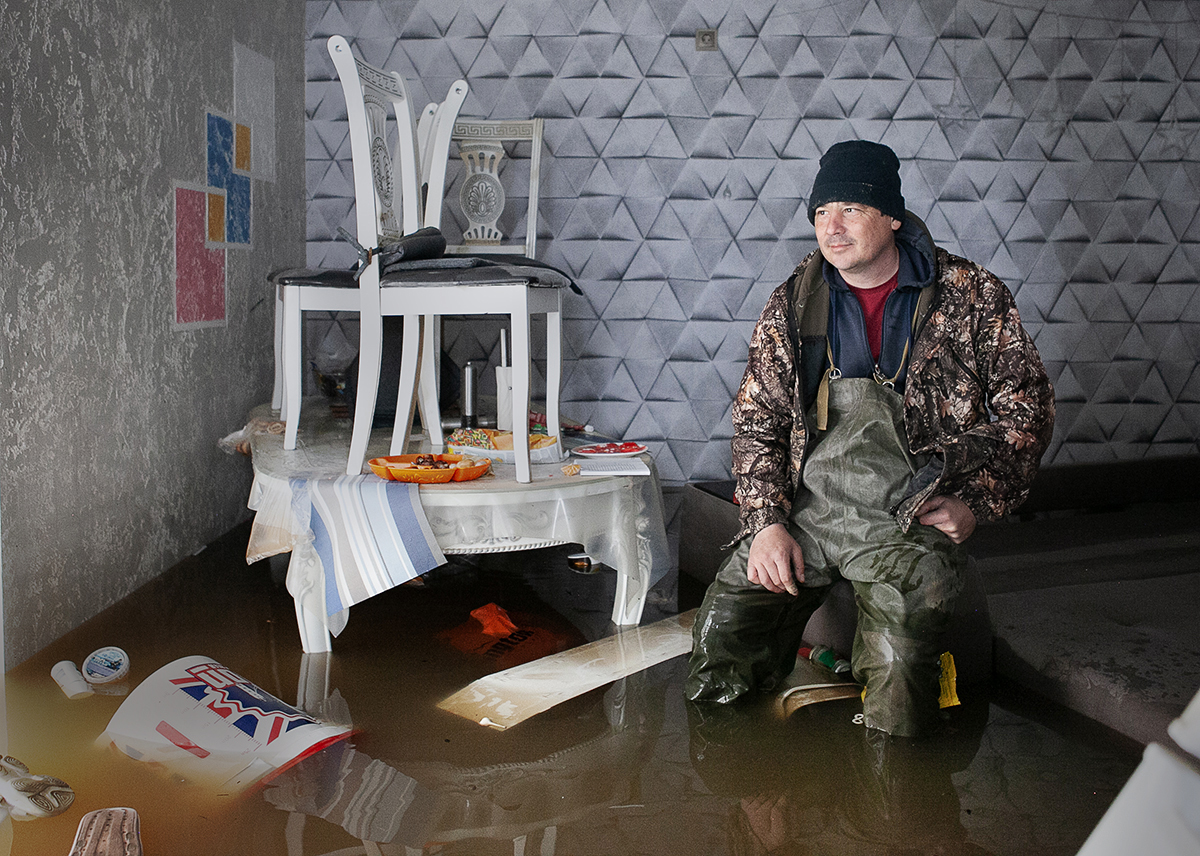
Earlier this year, unusually high spring runoff caused floods in Orenburg Oblast. Thousands were left homeless after dams burst along the Ural River in Orsk. Yet again, authorities were unprepared for a disaster, and many residents had to face the elements on their own. Last April, two journalists traveled to the flooded city to tell the story of how mutual aid and solidarity saved lives. They met with volunteers, including those rescuing animals, and one of them even managed to make it to “the island” in the middle of the Old City, where people formed a makeshift commune
“No threat”
By the middle of February, Russia’s Hydrometeorological Center had already deemed the passing winter the snowiest in several decades. Then, in late March, many Russian regions experienced a sudden temperature increase. In Orenburg Oblast, the daily average temperature jumped from -2° to 9°C (28° to 48° Fahrenheit) in a matter of days, while the daily high reached 16°C (60°). As a result, the spring thaw occurred faster than usual, overwhelming the Ural River.
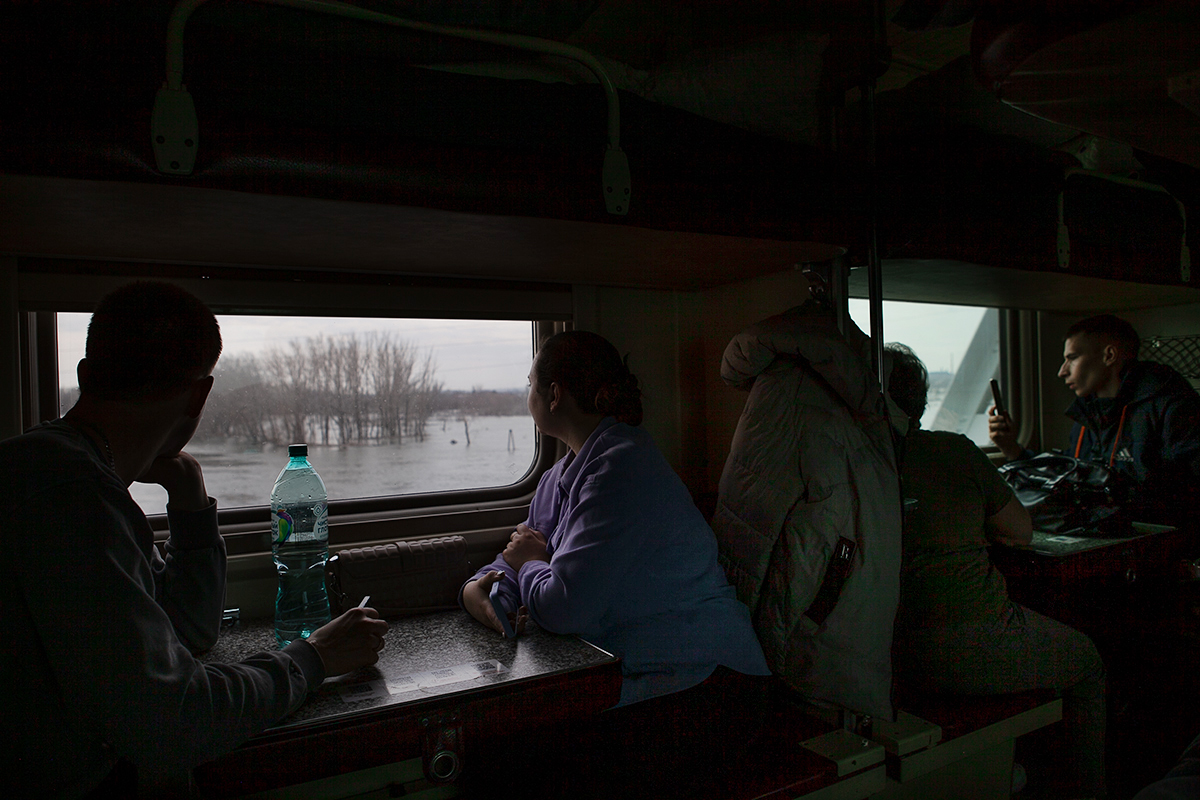
Orsk is the second-largest city in Orenburg Oblast, with some 190,000 residents. The first breach of its dam occurred on the evening of April 5. The waters reached the 9.6-meter mark – the norm is under five meters – and started to wash over the river’s left bank. On the next day there was another breach, and the waters surged past the right bank. In total, the people and animals of more than 10,000 households in the flood zone were trapped in their homes without drinking water, electricity, gas, heat or working sanitation.
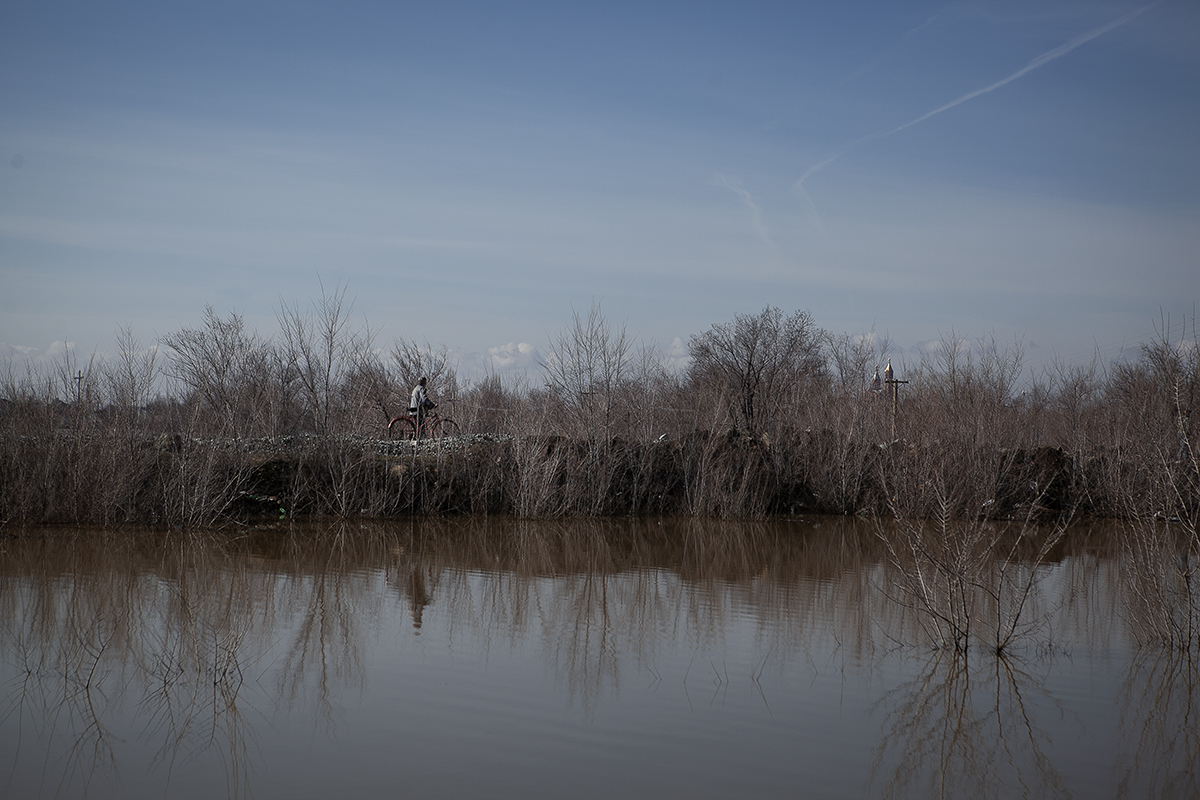 Orenburg Oblast authorities decided to build a protective dam back in 2010. Viktor Frants, leader of Orsk at the time, said it was intended to “forever solve the problem of the threat of flooding from spring runoff.” The dam went over budget by almost a billion rubles, and was built by Spetsstroy-3, which is two-thirds owned by a company called Zemstroy. Sergei Komarov, head of Zemstroy, offered a most original explanation for the breaches in the dam. He claimed in an appearance on state-controlled Channel One that it had been chewed through by rodents.
Orenburg Oblast authorities decided to build a protective dam back in 2010. Viktor Frants, leader of Orsk at the time, said it was intended to “forever solve the problem of the threat of flooding from spring runoff.” The dam went over budget by almost a billion rubles, and was built by Spetsstroy-3, which is two-thirds owned by a company called Zemstroy. Sergei Komarov, head of Zemstroy, offered a most original explanation for the breaches in the dam. He claimed in an appearance on state-controlled Channel One that it had been chewed through by rodents.
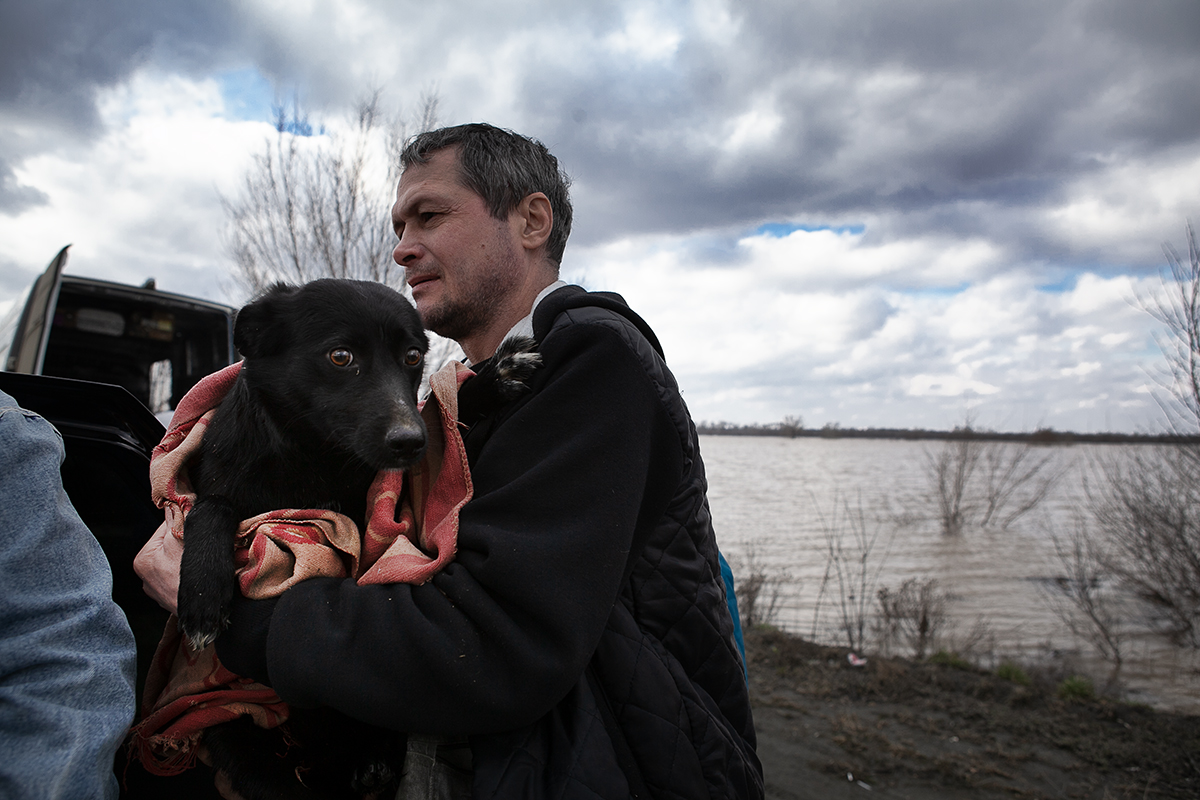
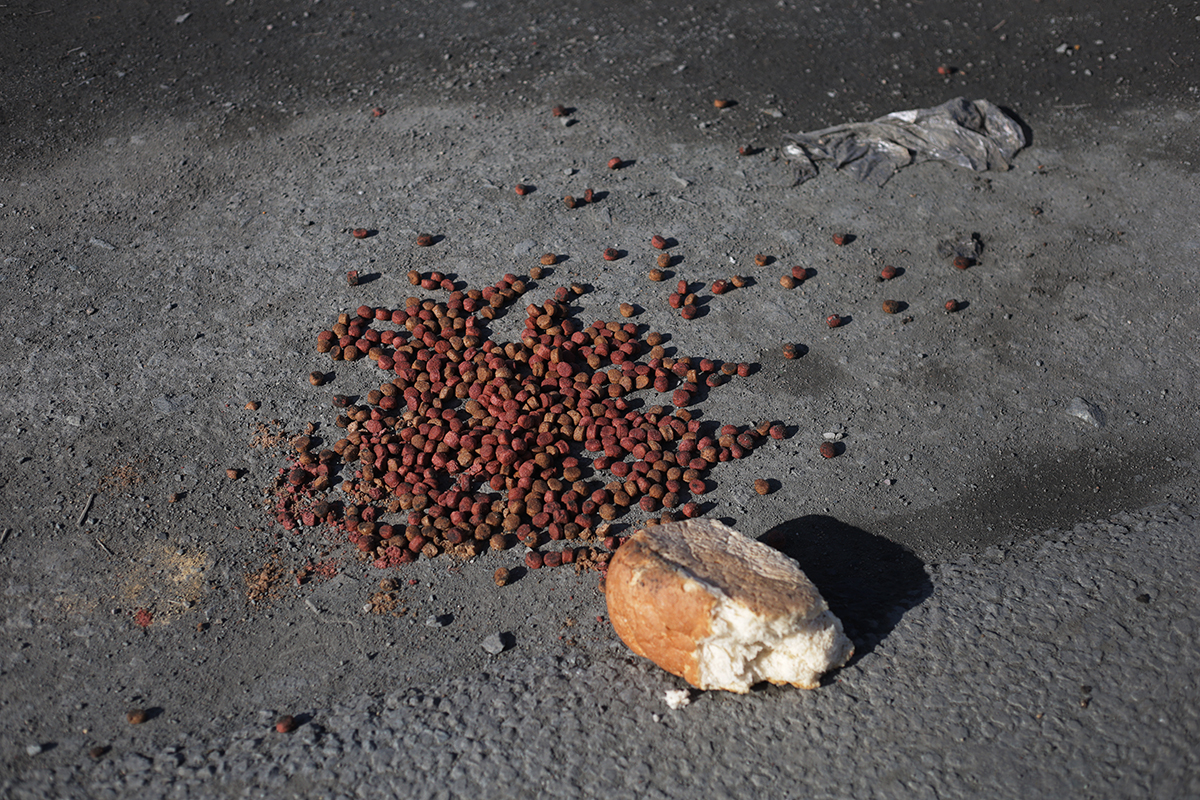 “When did you find out the dam had burst?” I ask the driver who brought me to the flood zone.
“When did you find out the dam had burst?” I ask the driver who brought me to the flood zone.
“Well, like everyone, on Friday night. The siren went off and they started announcing the evacuation. People were panicking like crazy. They grabbed what they could, but you can’t take everything. Some had cats or dogs, some had livestock – it was a mess. And if people couldn’t walk? If we’d known earlier, there would have been time to prepare at least a little.”
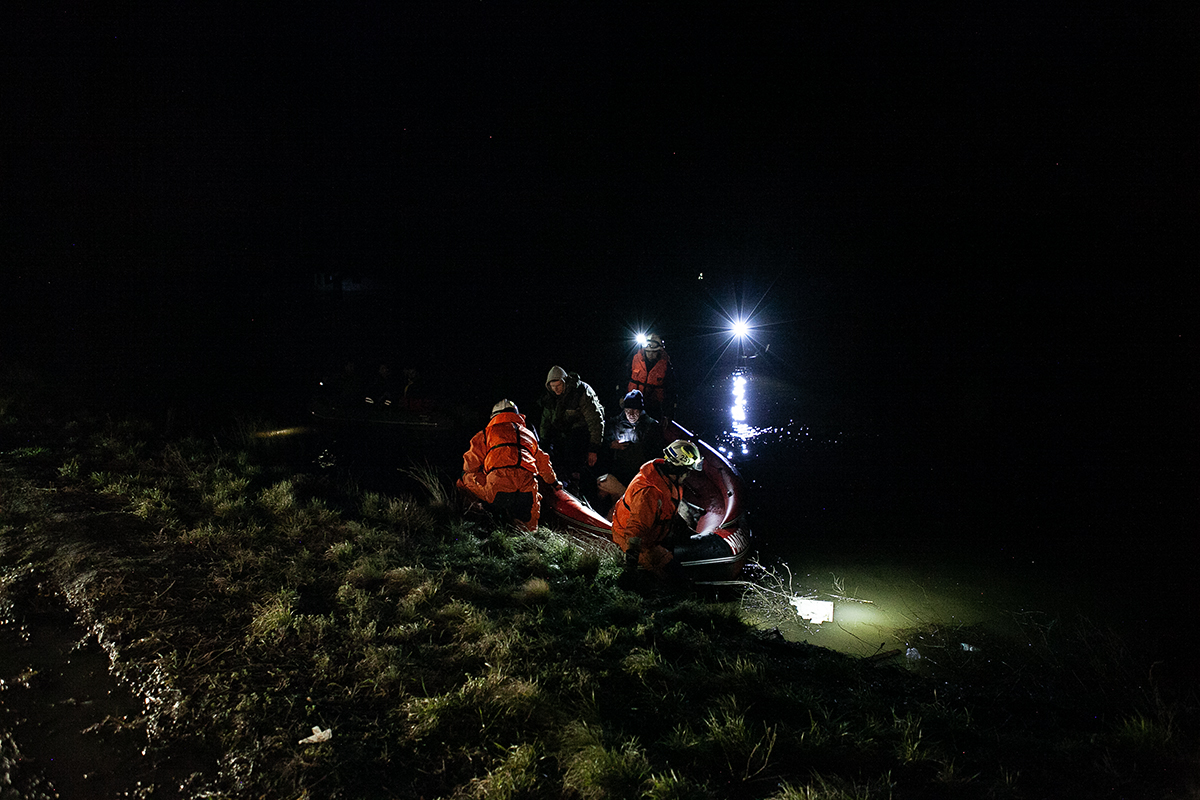 “There was no warning from the authorities?”
“There was no warning from the authorities?”
“What warning? We all found out that day!”
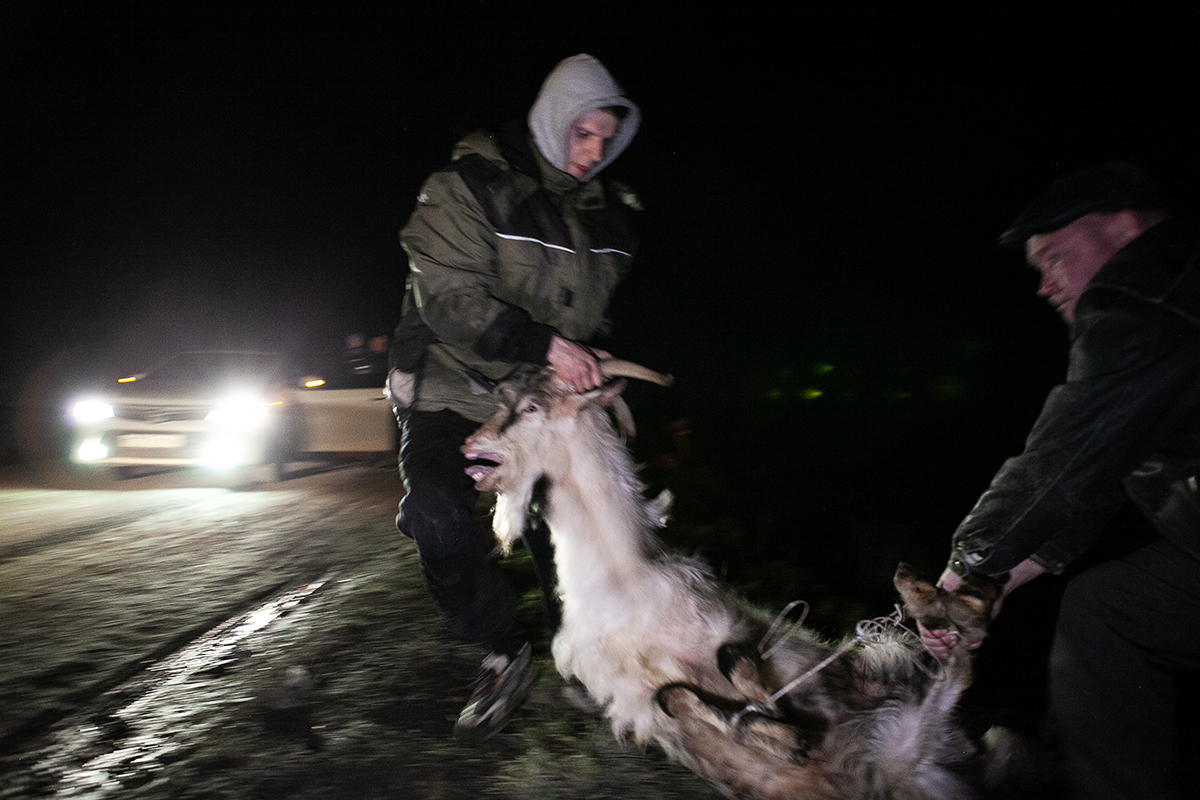 After residents complained that they suspected a leak in the dam, Mayor Vasily Kozupitsa visited it, looked it over, and reported that everything was fine. That was two days before the breach. “It’s a normal occurrence for there to be water in various places around the hydrotechnical structure,” Kozupitsa said.
After residents complained that they suspected a leak in the dam, Mayor Vasily Kozupitsa visited it, looked it over, and reported that everything was fine. That was two days before the breach. “It’s a normal occurrence for there to be water in various places around the hydrotechnical structure,” Kozupitsa said.
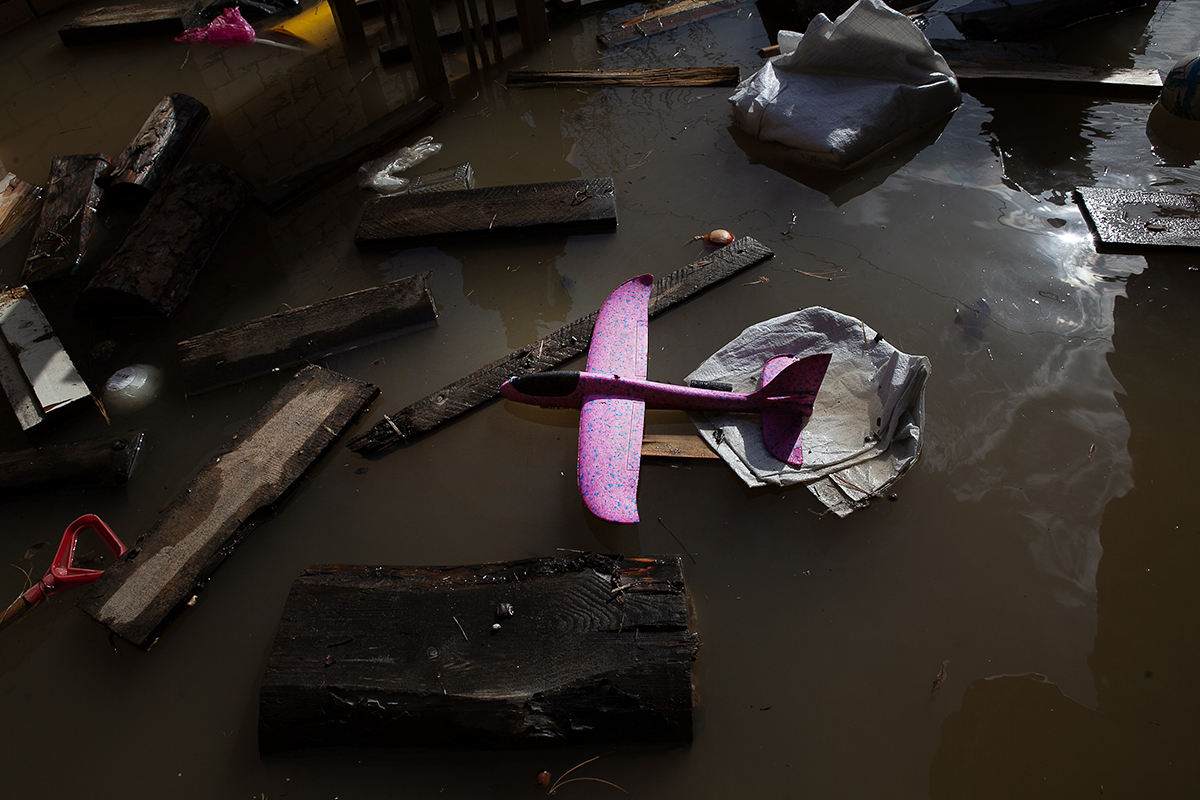
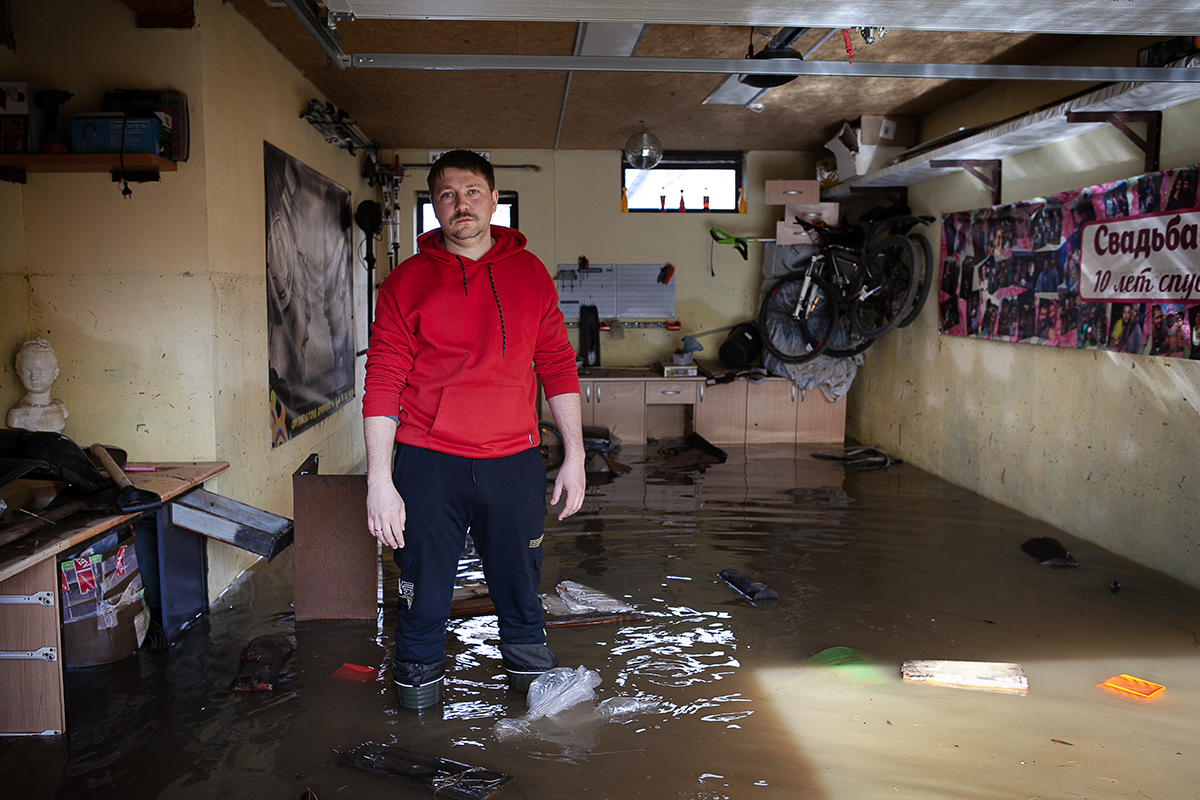 “No one is concerned about the potential for flooding.”
“No one is concerned about the potential for flooding.”
“No one’s coming”
We reach an area where inflatable boats are tied up. From here on, the road is flooded, and you can only reach the high-rise apartment buildings by boat – even though they are just across the intersection.
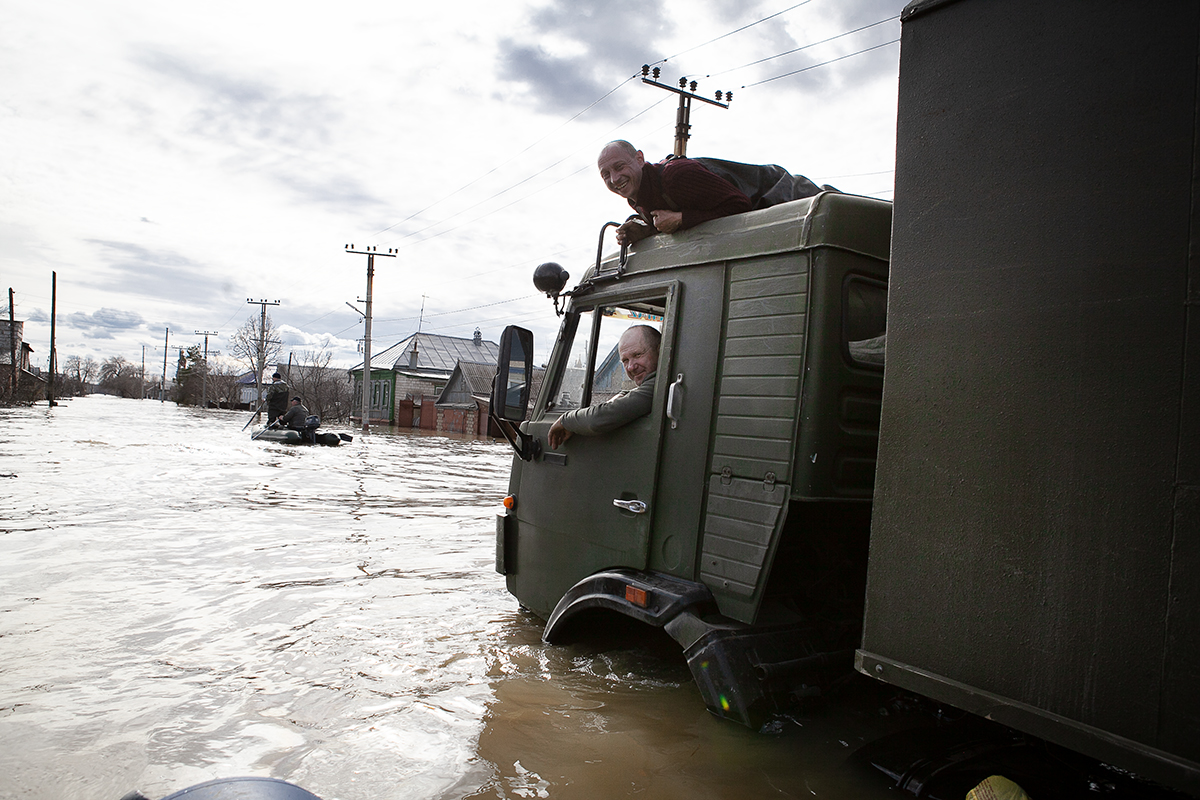
A two-person inflatable boat holding two men in orange vests is moored to dry land.
“Will you take me with you?” I ask. “I need to get to the other side.”
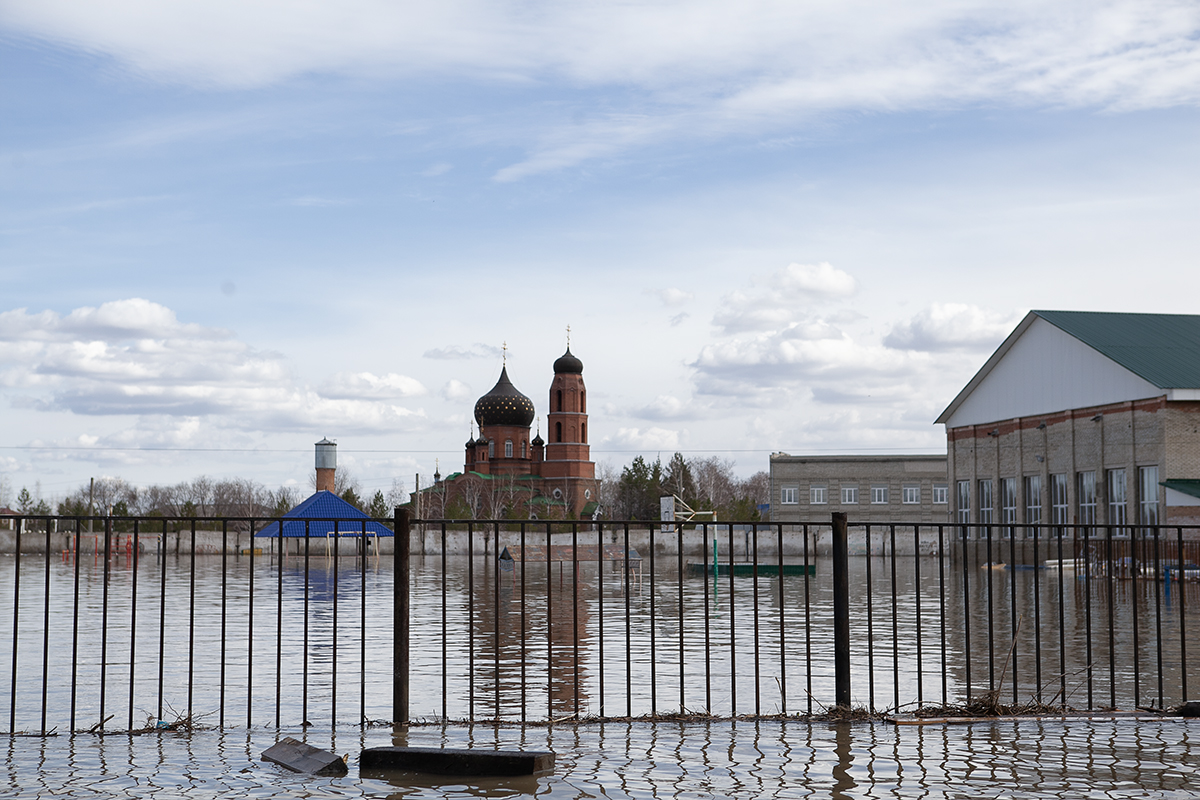 Yevgeny and Artyom are local volunteers from a newer part of the city that hasn’t been affected. On their days off they bring water to those who refused to leave their homes during the evacuation.
Yevgeny and Artyom are local volunteers from a newer part of the city that hasn’t been affected. On their days off they bring water to those who refused to leave their homes during the evacuation.
“I have a boat, is the thing,” says Artyom. “So I decided to help, because I can.” With his trim beard and a stylish undercut, he looks like a model; there’s a wedding ring on his finger.
“You must be volunteering on your days off. Is your wife okay with that?”
“How could anyone not be okay with it? Right now, everyone is doing what they can. We’ve got no one to count on, no one’s coming to the rescue – everybody here gets that,” Artyom explains.
“You don’t have faith in the authorities?” I ask.
“Of course not.”
“So you didn’t vote in the presidential elections?”
“I voted.”
“And who did you vote for?”
“For Putin.”
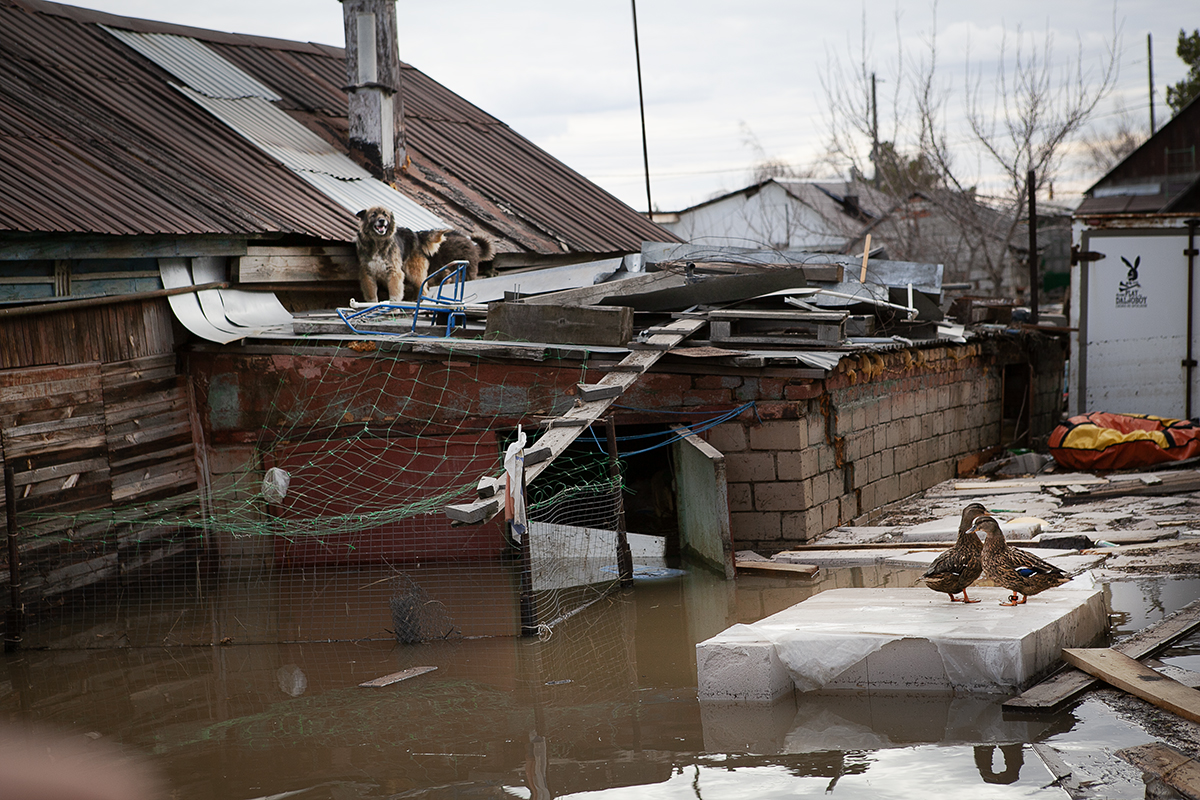
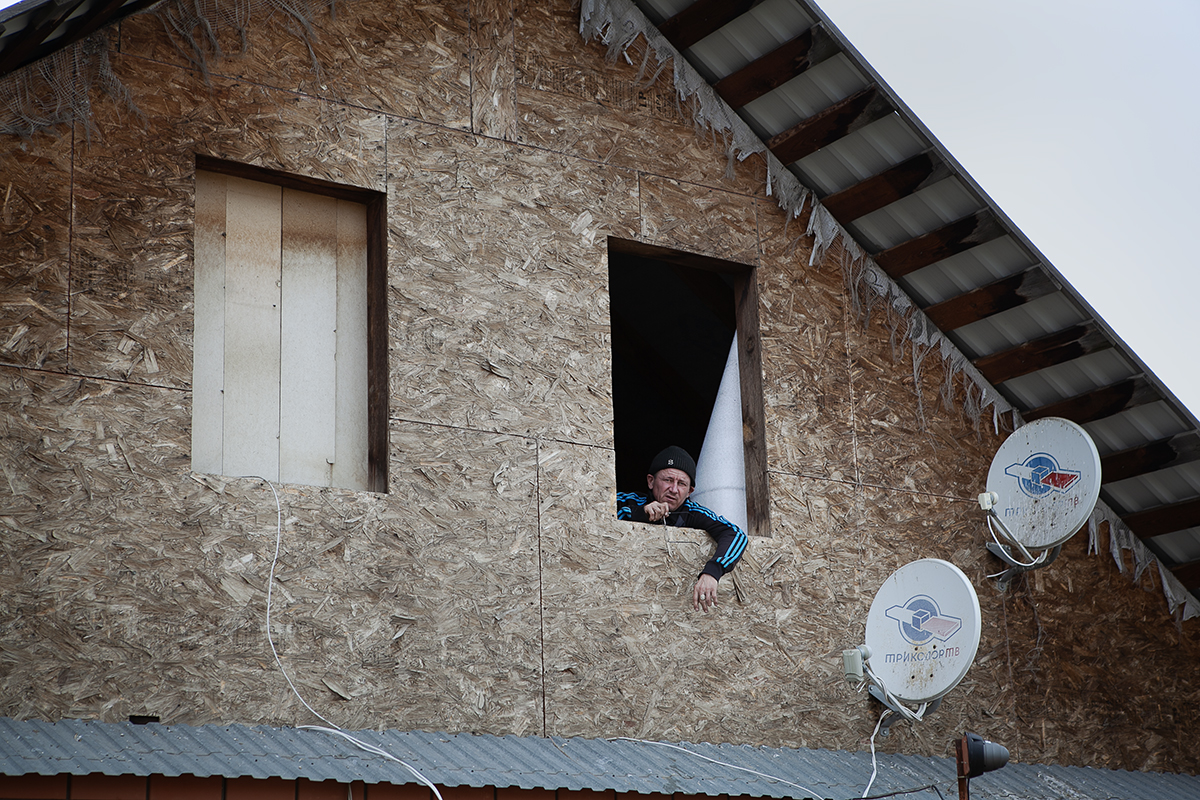 We enter the courtyard of a five-storey residential building. The water is up to the first-floor windows. It’s quiet, and all that’s visible are the roofs of parked cars.
We enter the courtyard of a five-storey residential building. The water is up to the first-floor windows. It’s quiet, and all that’s visible are the roofs of parked cars.
“Right, we’re going there.” Artyom points and I see an elderly couple looking out of a third-floor window. They wave to us: “Guys, we’re here!”
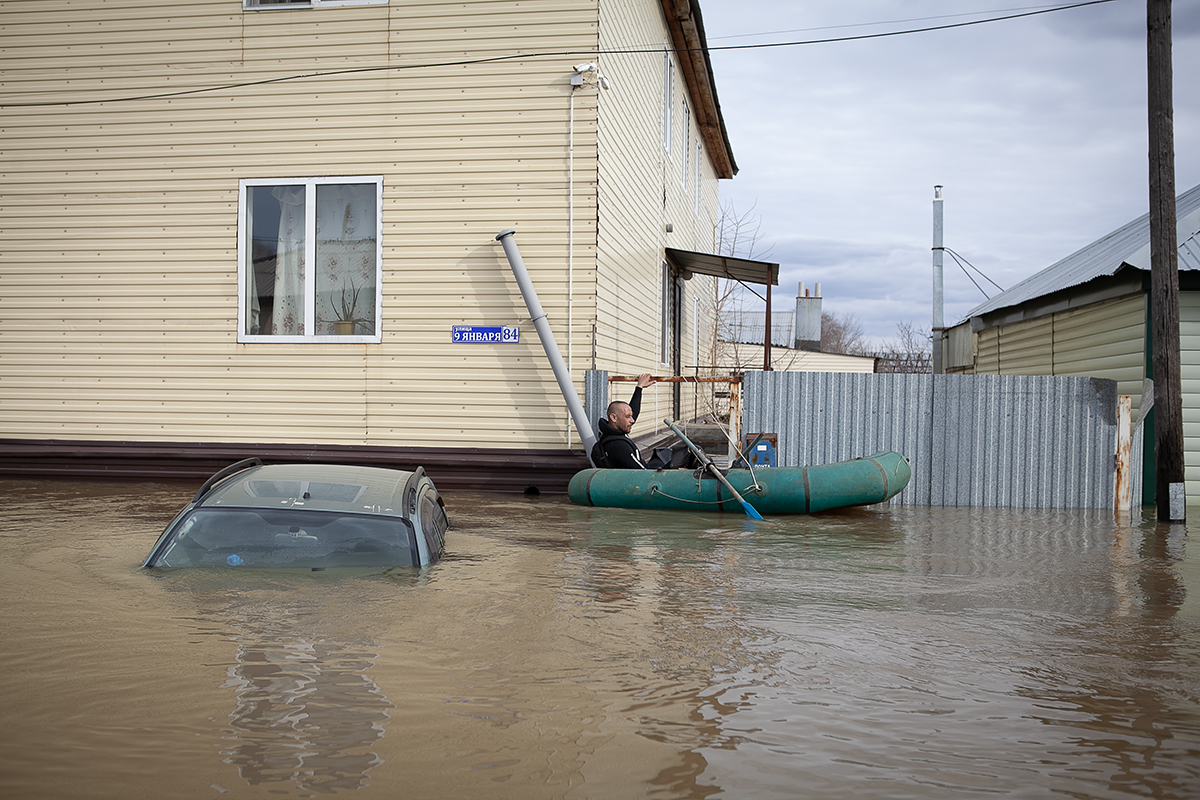 The two volunteers climb out of the boat and tie it to the handle of the building’s door, so the vessel and I don’t float away. While Artyom and Yevgeny are gone, I check that my devices are still safe and realize that, unlike my feet, they’re fine. My boots are already soaked through, and my feet are starting to freeze. I’ve been in the boat for just 15 minutes.
The two volunteers climb out of the boat and tie it to the handle of the building’s door, so the vessel and I don’t float away. While Artyom and Yevgeny are gone, I check that my devices are still safe and realize that, unlike my feet, they’re fine. My boots are already soaked through, and my feet are starting to freeze. I’ve been in the boat for just 15 minutes.
The men return, and we make our way farther amidst the buildings.
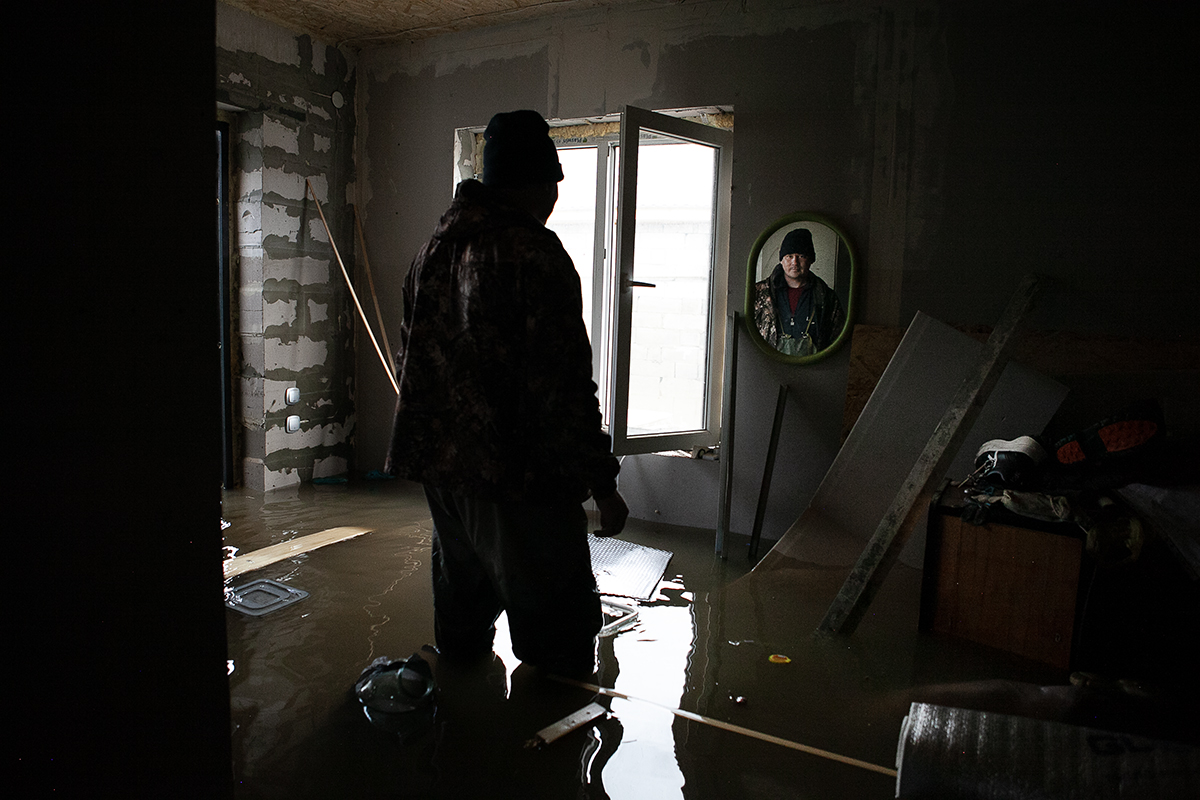
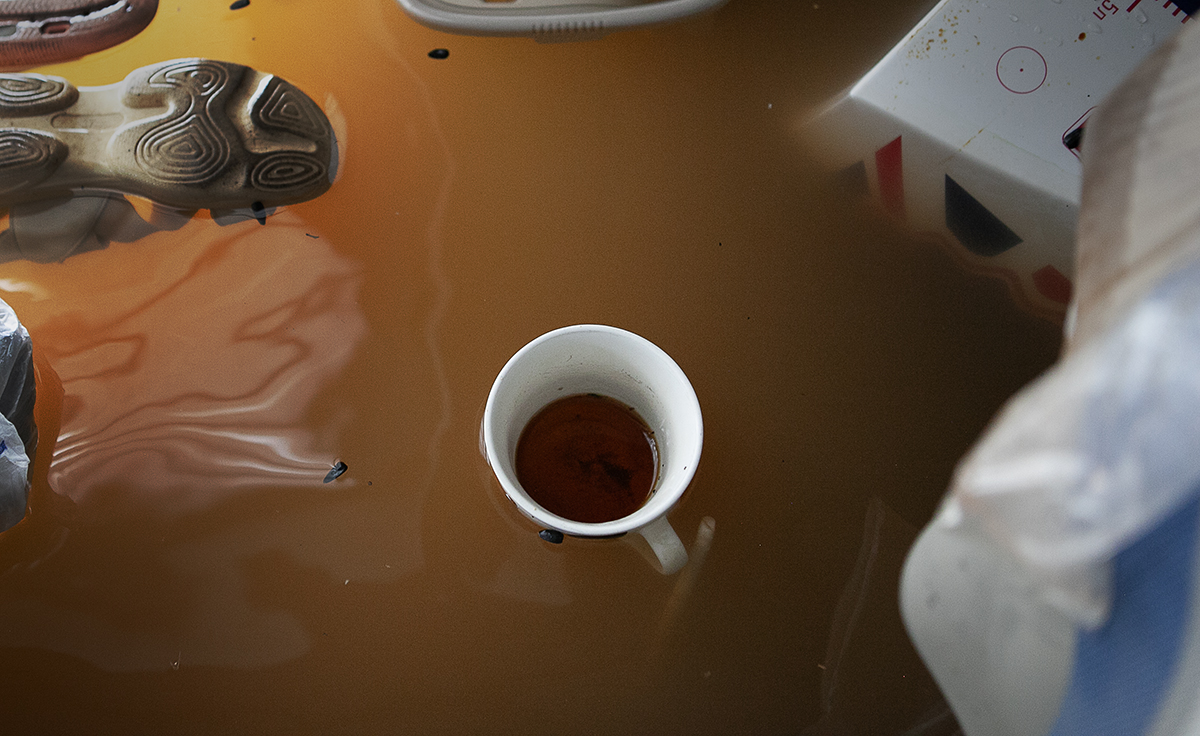 “Why are people staying in their homes when there’s no water, gas or heat?” I ask. “You can’t even charge your phone.”
“Why are people staying in their homes when there’s no water, gas or heat?” I ask. “You can’t even charge your phone.”
“Probably they’ve got nowhere to go, and the shelters are an experience that’s not for everyone,” Yevgeny answers.
“What’s so bad about the shelters?” I ask, looking for detail.
“There’s nothing bad. But just imagine: a room with dozens of cots and unfamiliar people, some with small children, some with pets. It’s not easy. Plus lots of people are afraid to leave their apartments because of looters. And there’s more than enough of them.”
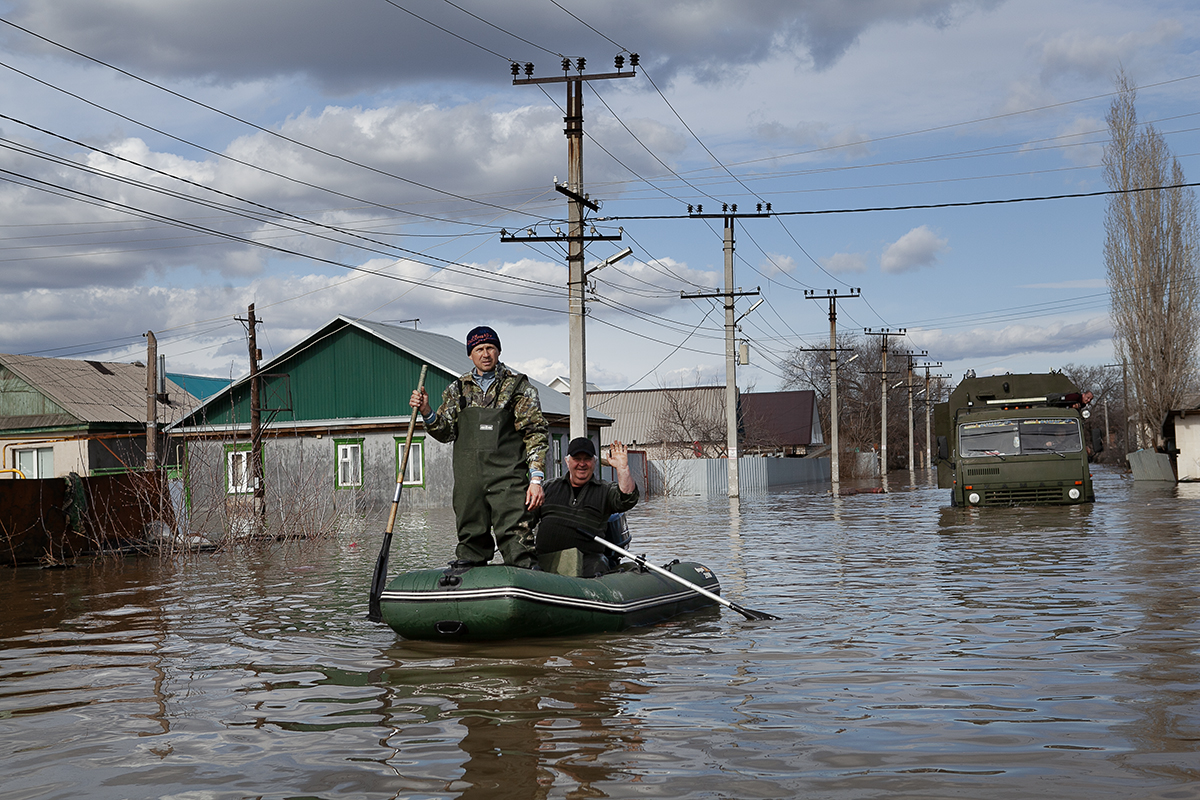 I comment that what they’re doing right now requires a lot of physical and emotional
I comment that what they’re doing right now requires a lot of physical and emotional
strength, like emergency services workers have. I ask where Yevgeny works.
“I transport bodies,” he answers with an embarrassed smile. “But you know, it’s not in an office, and the work is interesting.”
Yevgeny and Artyom tell me they’ve been helping with the emergency since last Friday. At first, people were panicking – no one knew what to do. But a chat soon started up on Telegram, and people began to organize themselves. Residents were quick to share information on the water’s movement and where it was and wasn’t safe to drive. People worked together alongside emergency services workers and the police. Local volunteers got involved right away, and then others started to come from outside the city as well.
“The locals rallied together quickly and acted decisively. It’s just a shame there wasn’t an evacuation alert sooner.”
That’s when I realized: if it weren’t for mutual aid, it would have been much worse here for a lot of people.
Olga
The house where Olga lives wasn’t in the flood zone. But when the siren sounded on the evening of April 5 and calls for urgent evacuation began, she remembered a large family from Tajikistan she knew that lived in the Old City. Olga had gotten to know this family several years ago, when Sokhibjon and his wife helped renovate her apartment.
“One of his daughters has cerebral palsy,” Olga says. “How can you evacuate with a bedridden child? My husband and I managed to get them here in a couple of trips. The family is large – there are six of them.”
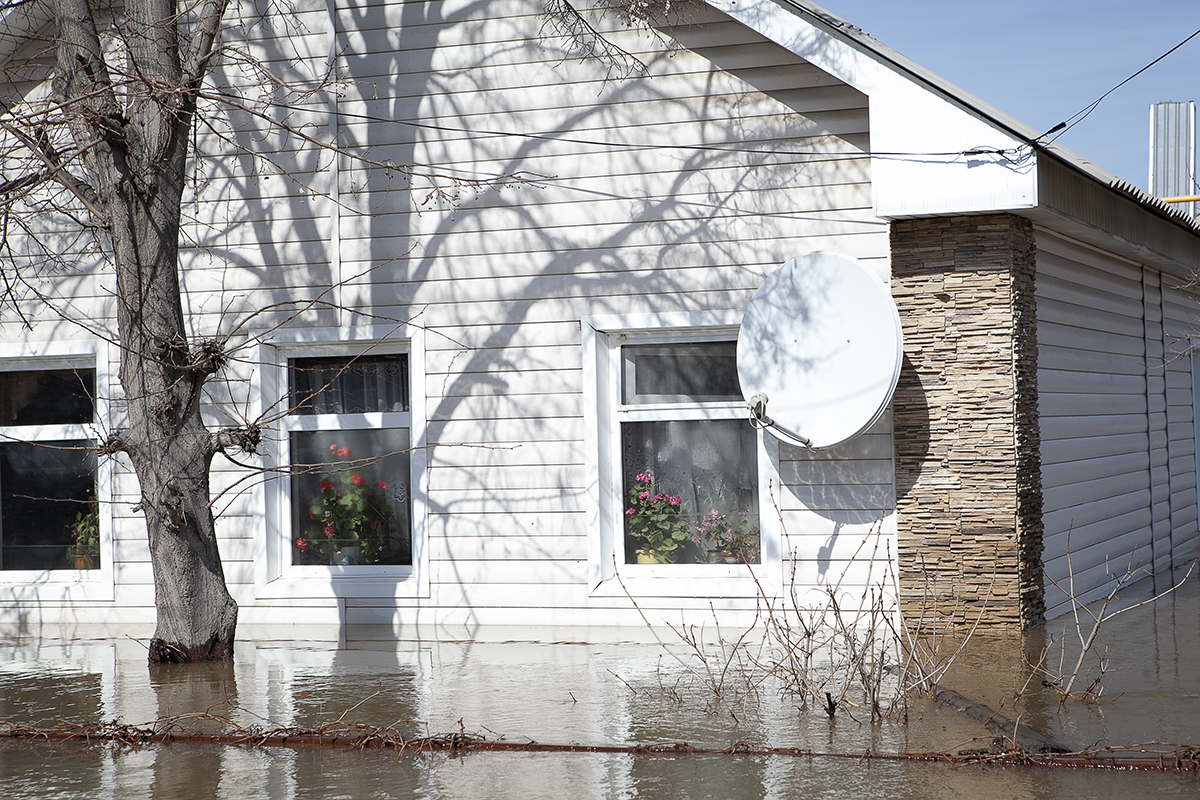 Sokhibjon has lived in Russia for a long time and is raising four school-aged children. He and his wife renovate houses for a living. The family received Russian citizenship a year ago and were able to buy a house that was built in 1905. In a matter of a few hours, that house – which they had spent half their lives saving for and had restored with their own hands – was almost completely underwater.
Sokhibjon has lived in Russia for a long time and is raising four school-aged children. He and his wife renovate houses for a living. The family received Russian citizenship a year ago and were able to buy a house that was built in 1905. In a matter of a few hours, that house – which they had spent half their lives saving for and had restored with their own hands – was almost completely underwater.
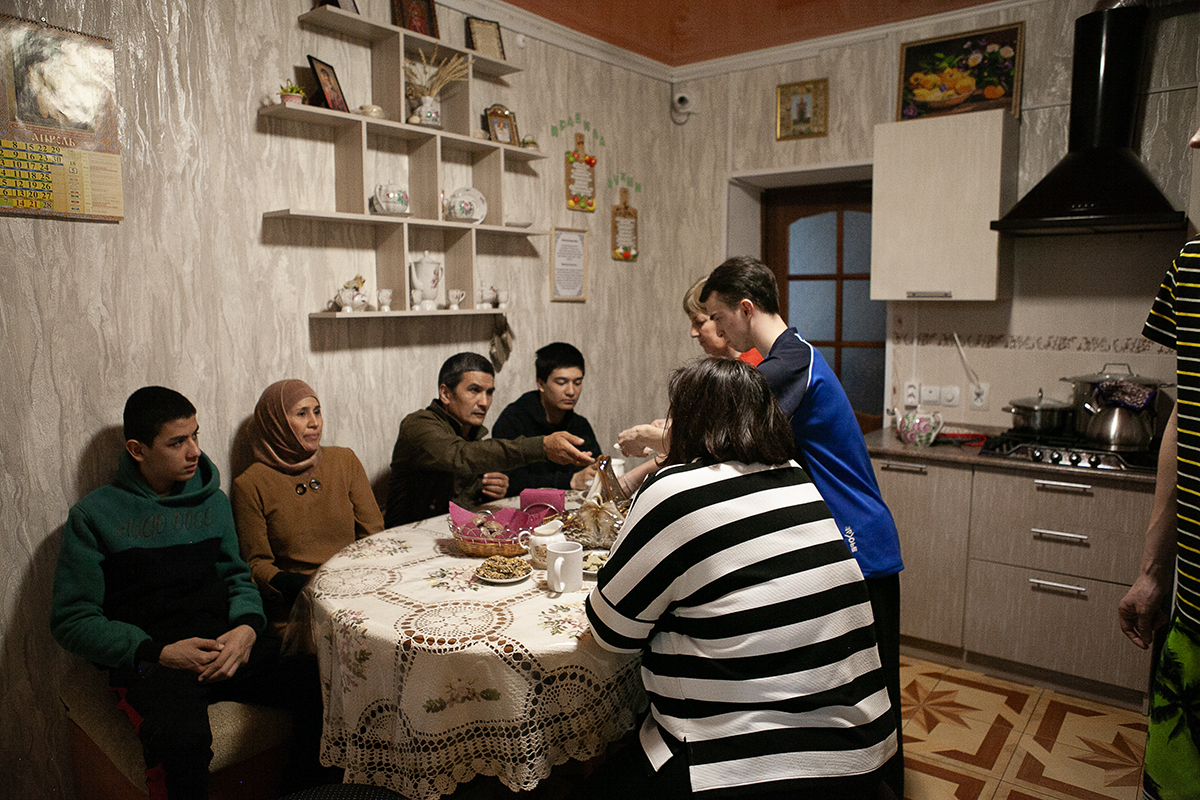 “Sokhibjon was impossible to look at,” Olga says. “He’s a reserved person, but at that moment I saw how lost he was, how the tears were welling up in his eyes.”
“Sokhibjon was impossible to look at,” Olga says. “He’s a reserved person, but at that moment I saw how lost he was, how the tears were welling up in his eyes.”
Olga put the family up in her home. She says it was the only choice she had – there was no other option.
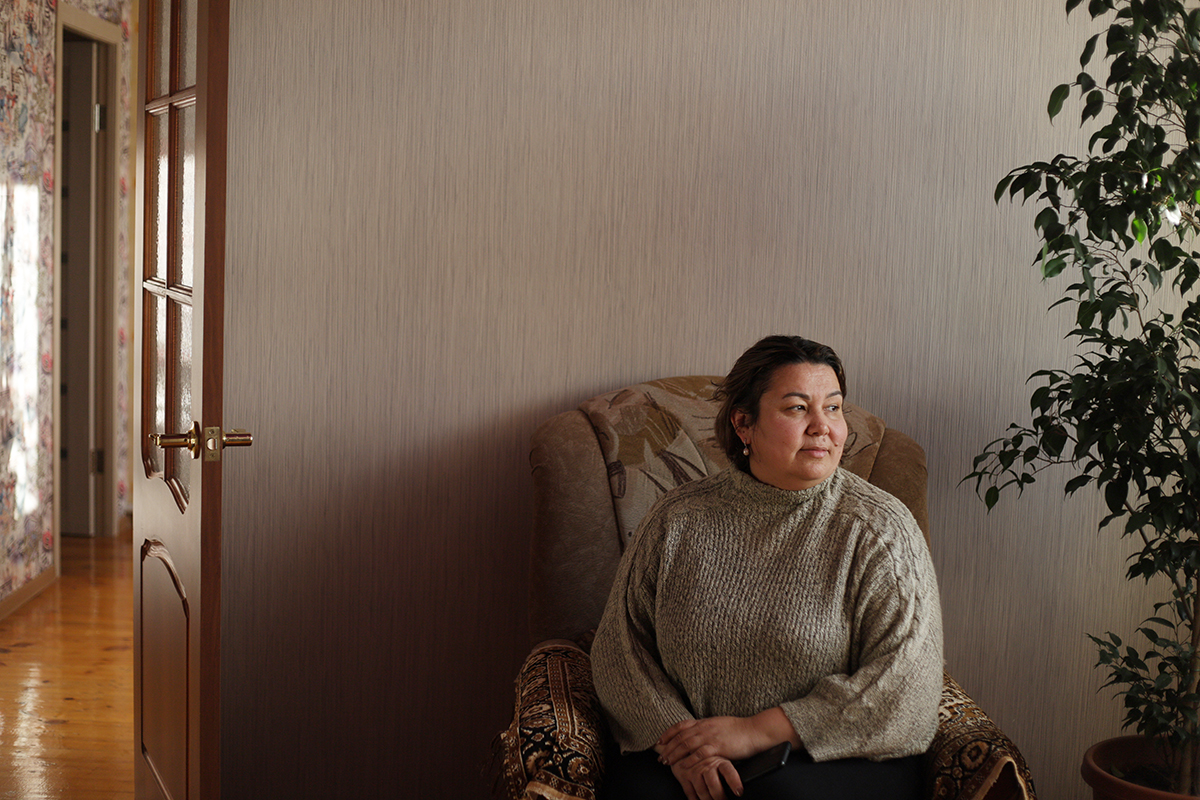 “Inviting someone to your home, that’s one thing. But when someone starts to live with you, that’s another. At first, we surprised each other a lot. For instance, during the religious fast that recently ended, they ate at night. And there are other habits of daily life to do with faith. But it’s no big deal, we’ve found a way to get along – we’ve just been respectful with each other.”
“Inviting someone to your home, that’s one thing. But when someone starts to live with you, that’s another. At first, we surprised each other a lot. For instance, during the religious fast that recently ended, they ate at night. And there are other habits of daily life to do with faith. But it’s no big deal, we’ve found a way to get along – we’ve just been respectful with each other.”
Olga helped Sokhibjon fill out the documents needed to get government compensation. They are hopeful that, after the waters recede, the family will somehow be able to figure out how to repair their home.
Animal Rescuers
It hasn’t just been people helping people. They’ve been rescuing animals, too.
“We’re collecting animals that are still in the water in the flooded regions,” says Yelena, one of the animal rescue volunteers. “We don’t have our own boats, but people rarely refuse to help.”
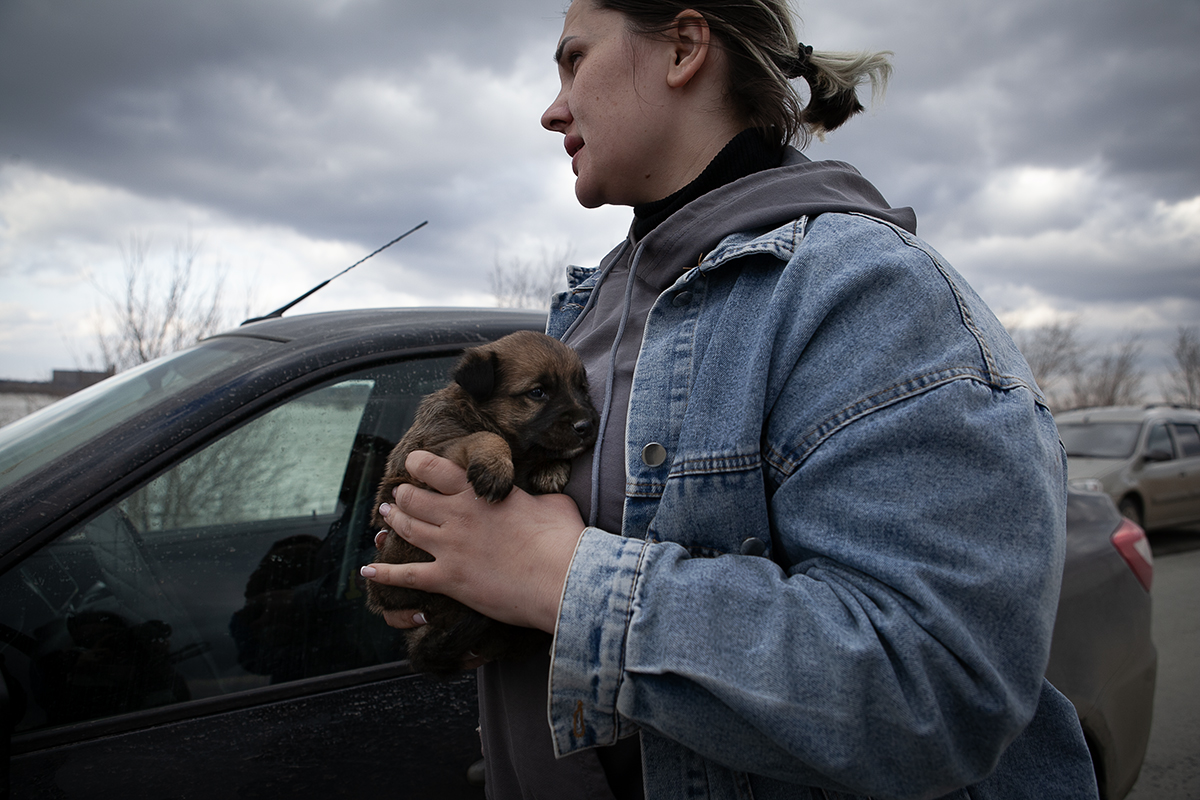 Yelena is coordinating the work of other volunteers on the ground. They also organized themselves when it became clear that no help was coming. Volunteers are taking abandoned dogs and cats that they managed to extract from flooded homes and sending them to a temporary shelter 15 kilometers from Orsk, in the city of Novotroitsk.
Yelena is coordinating the work of other volunteers on the ground. They also organized themselves when it became clear that no help was coming. Volunteers are taking abandoned dogs and cats that they managed to extract from flooded homes and sending them to a temporary shelter 15 kilometers from Orsk, in the city of Novotroitsk.
“We actually have a lot of volunteer organizations in Orsk, but we don’t associate with each other – that’s just how it is. But when the disaster arrived, we joined forces.”
Yelena points out some young women nearby.
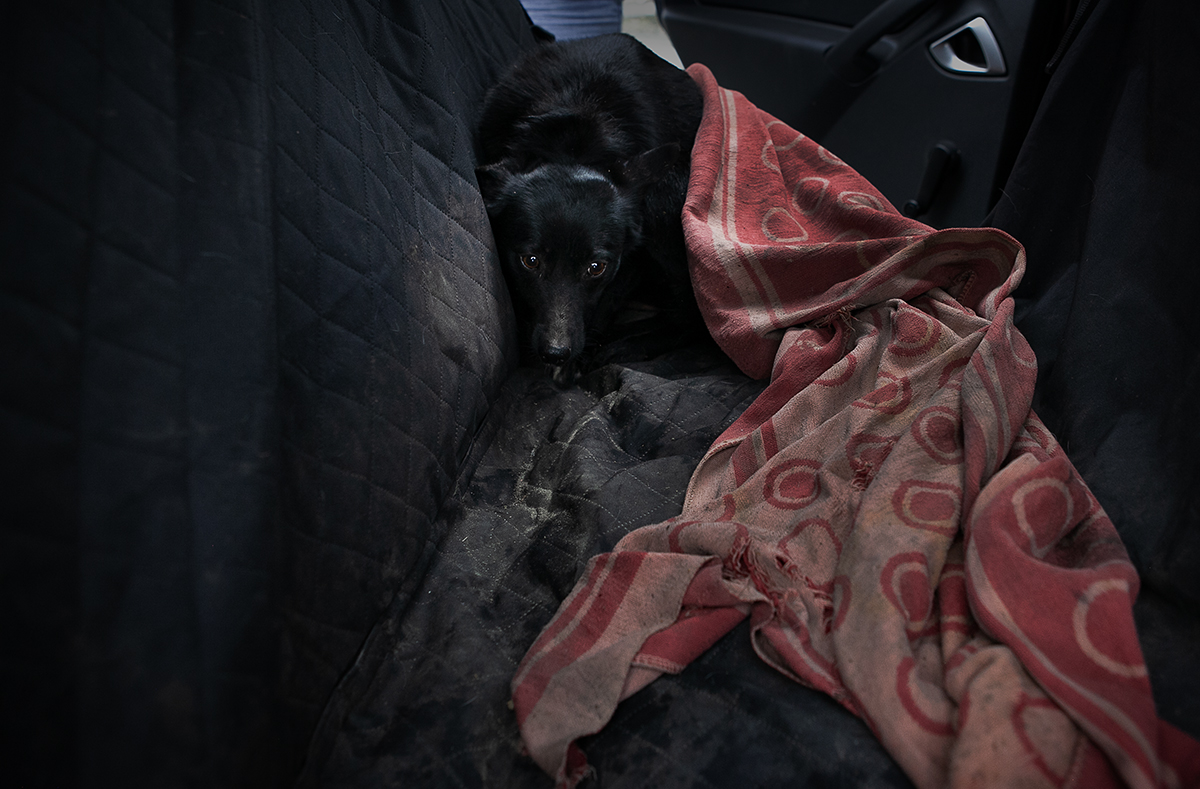 “These girls here came looking for their own dogs and stayed to help as well. There are volunteers from Donetsk, too. They’re over on the other side of the Nikel highway doing the same thing we are. But they have more capacity: they’ve got special equipment and boats – they’re professionals.”
“These girls here came looking for their own dogs and stayed to help as well. There are volunteers from Donetsk, too. They’re over on the other side of the Nikel highway doing the same thing we are. But they have more capacity: they’ve got special equipment and boats – they’re professionals.”
Yelena sends everyone who asks her how to find their pet to 11 Lysov Street. It’s the address of the Novotroitsk shelter where they’ve arranged to send all the rescued animals.
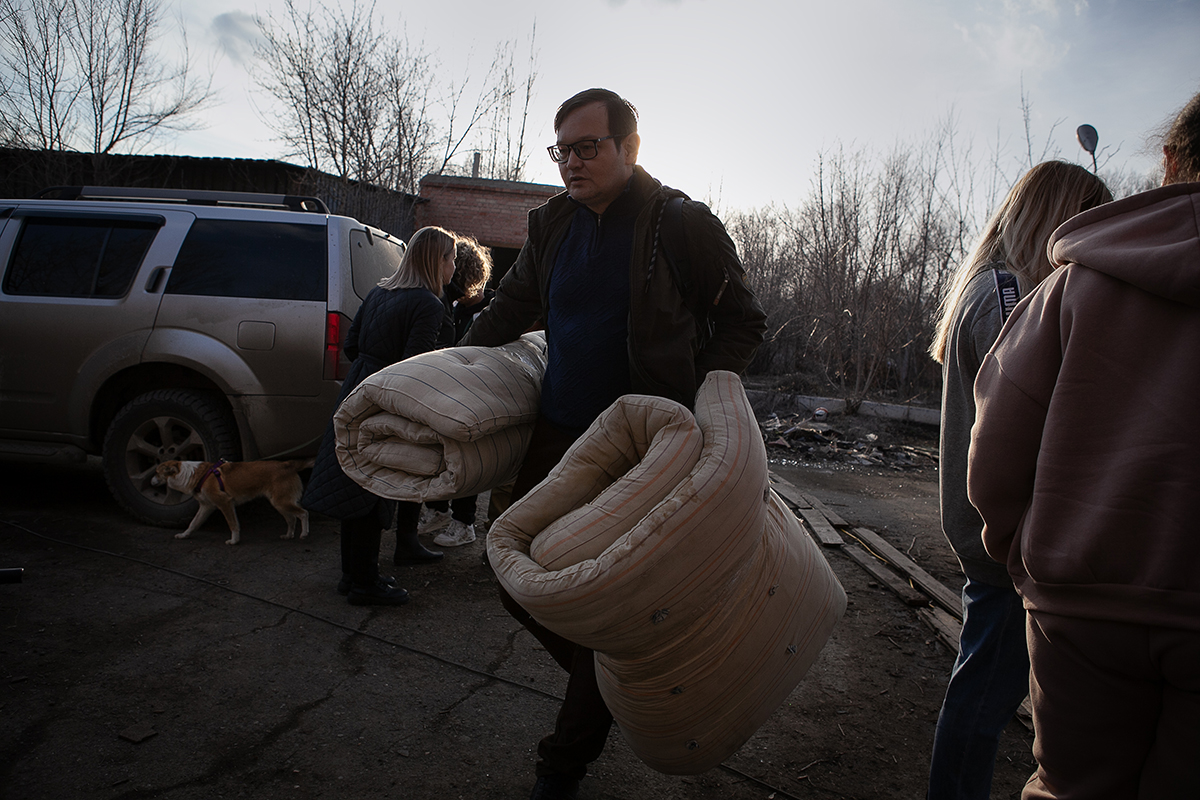 The shelter is made up of several abandoned single-storey buildings that look like a 1930s military hospital. There is no electricity, heating or sanitation.
The shelter is made up of several abandoned single-storey buildings that look like a 1930s military hospital. There is no electricity, heating or sanitation.
“Let us through, let us through, we’ve got a kitten in bad shape,” says Tatyana Bryndina, who runs the volunteer movement Julbars and is trying to help me squeeze through a crowd of people and dogs.
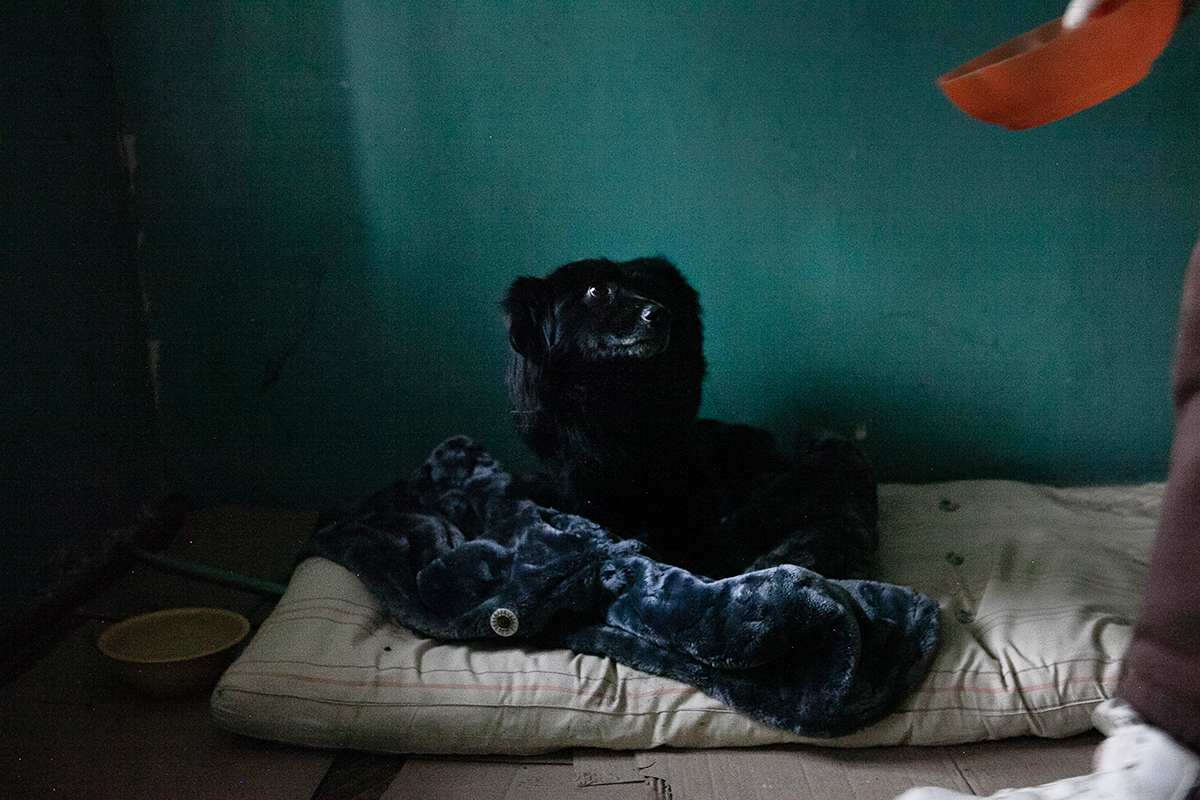 I’m holding a carrier into which someone – maybe because they weren’t aware, or just in the midst of the turmoil – placed a pair of cats who didn’t know each other. The animals got into a fight en route, and the younger one needs veterinary care.
I’m holding a carrier into which someone – maybe because they weren’t aware, or just in the midst of the turmoil – placed a pair of cats who didn’t know each other. The animals got into a fight en route, and the younger one needs veterinary care.
“Who stuck two cats into one carrier?” Tatyana asks as she tries to open the door of the carrier, which is literally falling apart in her hands.
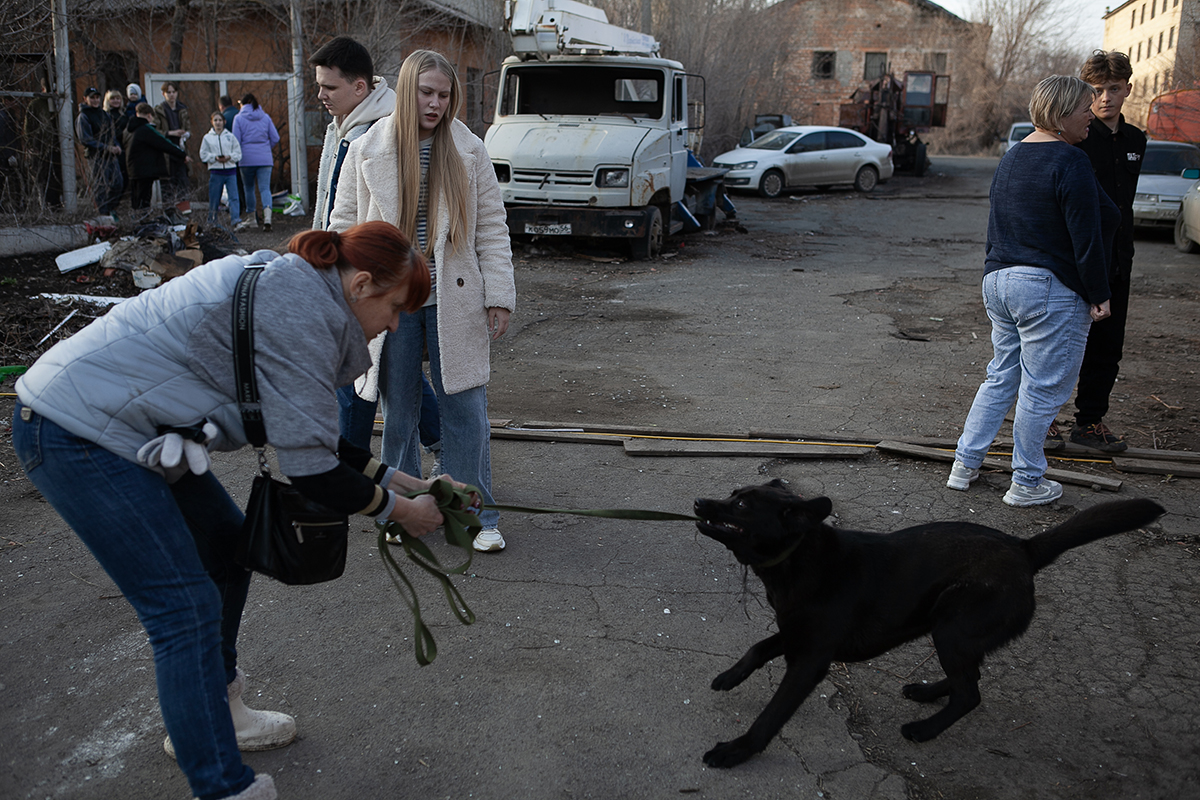 “Are you short on cages?” I ask. “What are you lacking most of all right now?”
“Are you short on cages?” I ask. “What are you lacking most of all right now?”
“We don’t have enough space! We’ll even pay for it – people have been helping a lot financially these past few days. But where do we find a place we won’t get kicked out of?”
Tatyana tells me that she recently met with Orenburg Oblast Governor Denis Pasler, but he made no commitment to solve the problem of finding space for the animals.
“But the most terrible thing is that if no one comes soon to claim all these animals, under the new law they’ll have to be euthanized as strays,” Tatyana says. “And I have no idea what to do about that.”
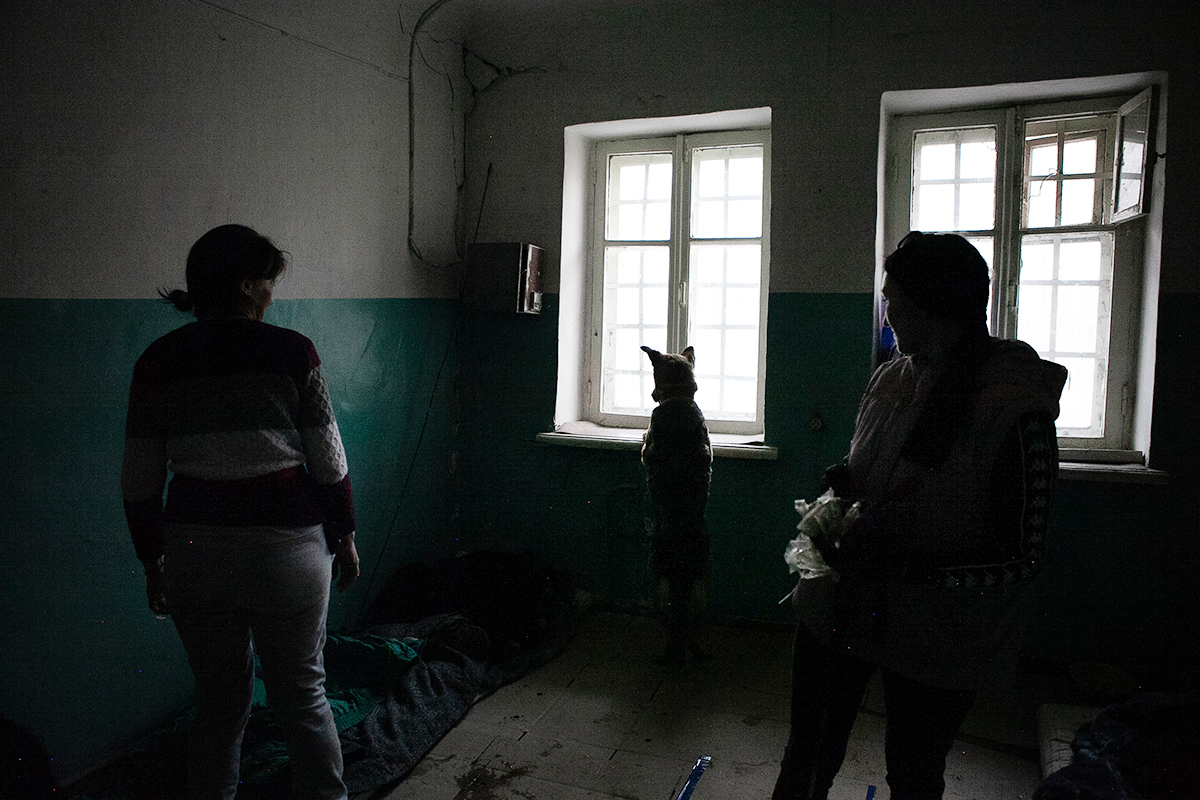 At the end of March the Orenburg Oblast legislature, as well as elected officials in a number of other regions, passed a law permitting the killing of stray dogs and cats. And all of the animals that were rescued in the flood zone by emergency services workers, volunteers and even owners themselves now fall officially under this law. Many people want to take their pets back but have nowhere to keep them, as their homes were completely destroyed by the flood.
At the end of March the Orenburg Oblast legislature, as well as elected officials in a number of other regions, passed a law permitting the killing of stray dogs and cats. And all of the animals that were rescued in the flood zone by emergency services workers, volunteers and even owners themselves now fall officially under this law. Many people want to take their pets back but have nowhere to keep them, as their homes were completely destroyed by the flood.
Natalya, another volunteer, is a successful lawyer who lives in another city and just happened to be in Orsk visiting her parents when the dam burst, then stayed to help.
“We’ve only lost our dacha. But we’re not crying over it anymore. It’s a shame, of course, but it’s nothing compared to our relatives who’ve been left completely homeless.”
Natalya is an attractive young woman in an attractive SUV. She says she chose a path for herself that she thinks is the most in need during any catastrophe: helping animals.
“I know that the people helping the animals right now are temporary, and that Tatyana will very soon be left alone. Something has to be done about that,” Natalya says.
Currently, one of the rooms at 11 Lysov Street is packed full of pet food, but 80 percent of the shelter’s dogs and cats will never be picked up: some people aren’t looking for their pets, and others have nowhere left to take them. So, while the stock of resources looks impressive for now, if you divide it among hundreds of dogs and dozens of cats, it’s almost nothing, Natalya says. Meanwhile, she can’t keep up with her messages on social media – her friends and acquaintances from various countries are asking what they can do to help.
“Two years ago, I had the sense that my life was ending,” Natalya says. “But now, over these past few days, I’ve come alive again, as though everything was leading me to be right here.”
The Island
The road leading to the dam is surrounded by water. There are vehicles here belonging to volunteers, rescuers and the police. Every now and then, a boat comes in to shore. Along the road are piles of dry dog food, loaves of bread, and jars of pickled vegetables.
A boat pulls in. Two men and a woman climb out of it, slipping on the wet clay. The woman crouches down, stares dully at the rippling waters, and starts to cry. Somewhere out there is her completely flooded home.
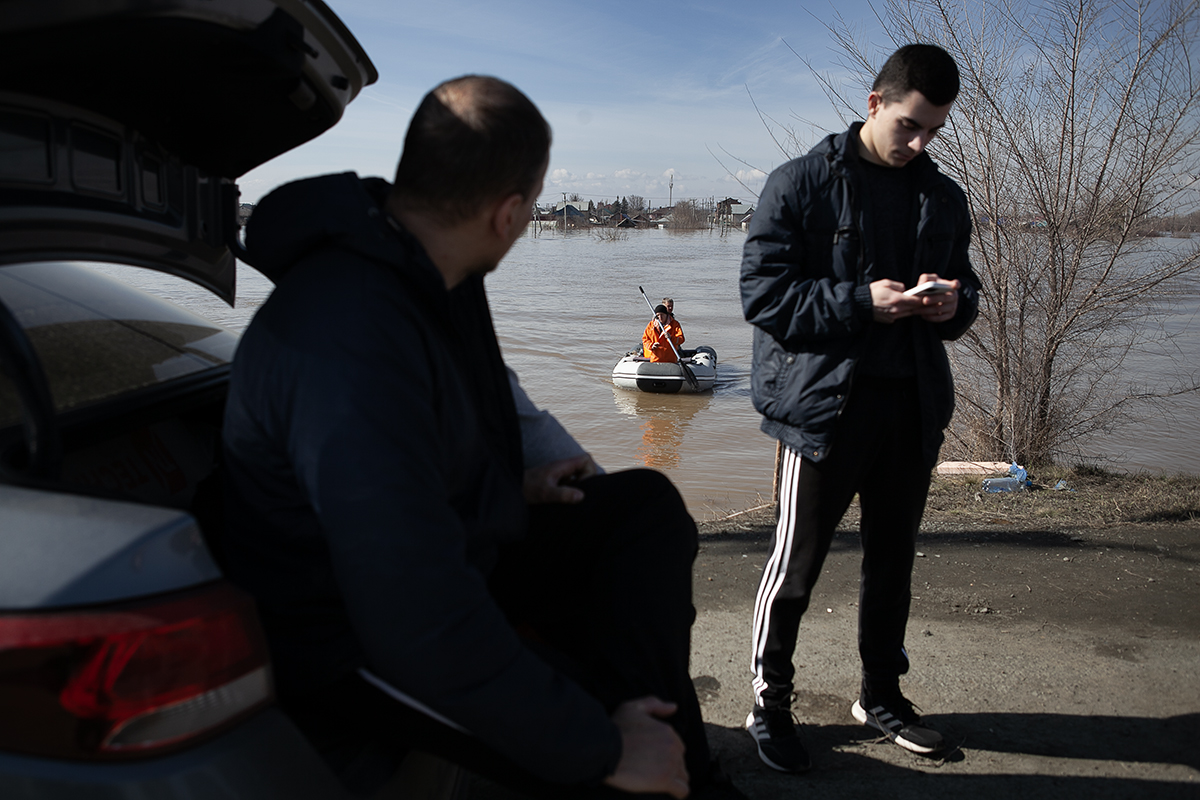 “Hang in there! Everything is going to be okay. You’ve got your arms and legs, you’ve got your health, and that’s what really matters,” one of the men says to her cheerfully.
“Hang in there! Everything is going to be okay. You’ve got your arms and legs, you’ve got your health, and that’s what really matters,” one of the men says to her cheerfully.
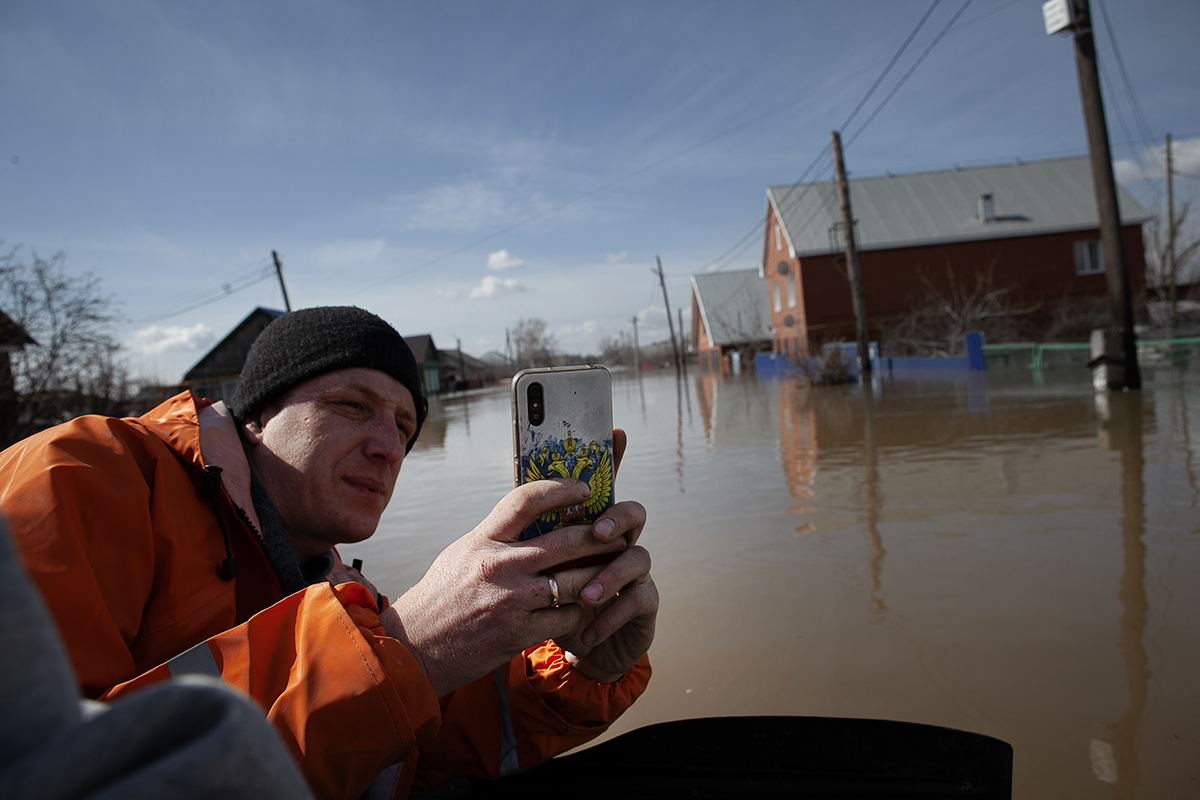 The man is Pavel. He works as a miner. He and his co-volunteer, also Pavel, came home to Orsk together. When they asked for time off, their employer immediately got on board: their vacation time was moved and their colleagues bought them a boat. Both are fathers with multiple children. They say the water came in so fast, their wives and children barely made it to safety. They didn’t take anything with them. Now, they’re living with friends and relatives.
The man is Pavel. He works as a miner. He and his co-volunteer, also Pavel, came home to Orsk together. When they asked for time off, their employer immediately got on board: their vacation time was moved and their colleagues bought them a boat. Both are fathers with multiple children. They say the water came in so fast, their wives and children barely made it to safety. They didn’t take anything with them. Now, they’re living with friends and relatives.
The men journey along the flooded streets and take videos of houses, making sure the address and extent of damage are visible. Sometimes, they also manage to rescue animals. One of the Pavels started a chat in WhatsApp where people can post requests for help.
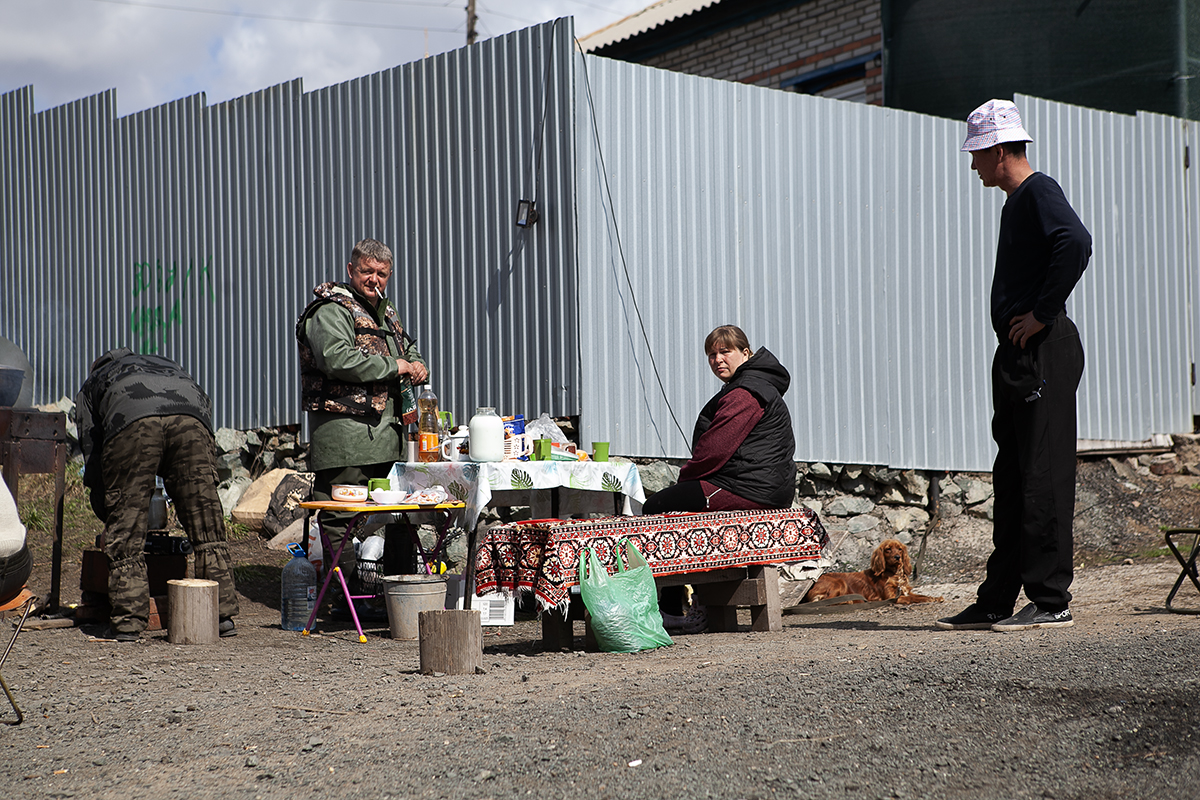 “We aren’t taking money for this, though people do offer it. People have already given us what we need: the clothing and the boat. It wouldn’t hurt to have a walkie-talkie, but I don’t like to ask.”
“We aren’t taking money for this, though people do offer it. People have already given us what we need: the clothing and the boat. It wouldn’t hurt to have a walkie-talkie, but I don’t like to ask.”
“But you’re not asking for it for yourself – it’s for the work.”
He considers it for a second. Then he waves his hand, answering himself:
“Yeah, no, I won’t.” He continues. “We wake up in the morning and spend the whole day on the water, until nighttime. We capture footage of the damage so people have something to use in court.”
“May 1st Street, number 98,” the other Pavel says, recording video on a phone in a worn case with the image of a double-headed eagle.
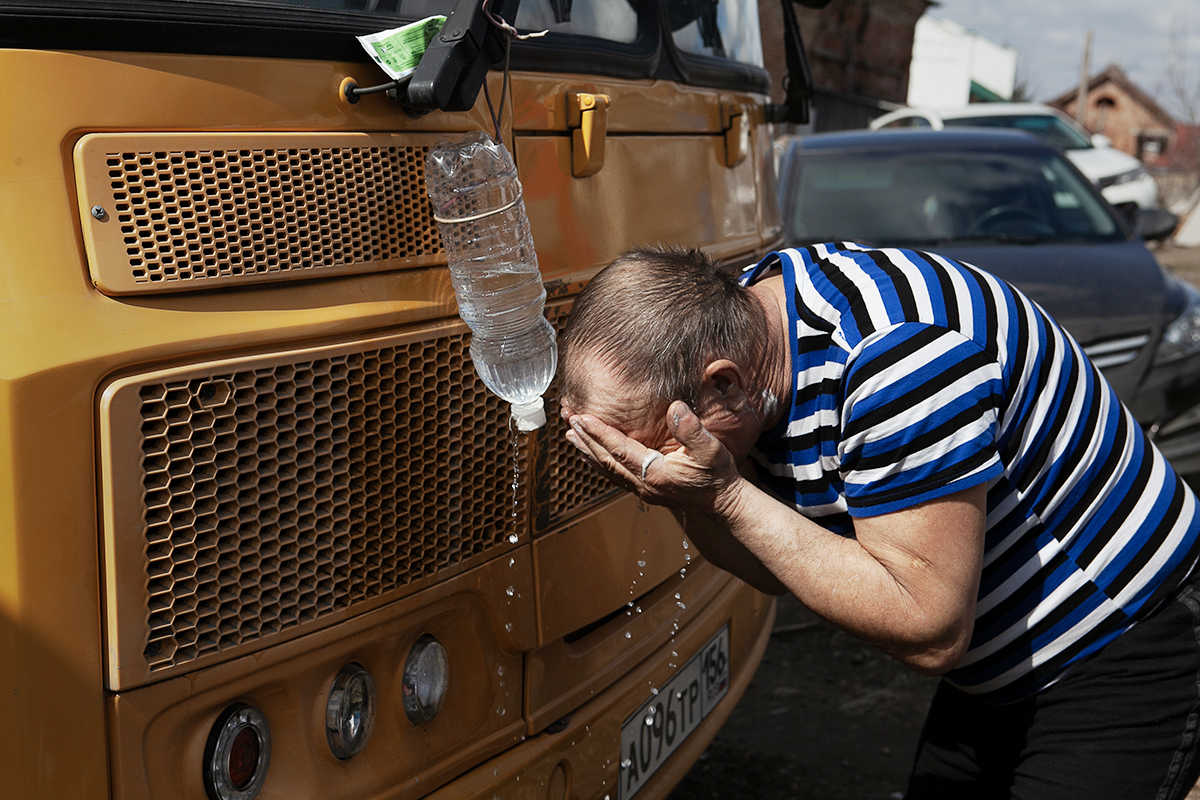 Judging by the number of requests in the chat, everyone who’s been affected already understands that compensation payments aren’t going to come with a snap of the fingers, and they’ll have to take the government to court for money to cover the damages.
Judging by the number of requests in the chat, everyone who’s been affected already understands that compensation payments aren’t going to come with a snap of the fingers, and they’ll have to take the government to court for money to cover the damages.
The Pavels agree to take me to “the mountain” – that’s what locals call the part of the city that’s on higher ground. It’s now surrounded entirely by water and looks like an island. When the flooding started, people drove there to save their vehicles – and ended up in a trap. The Cathedral of the Transfiguration of Christ, the Orthodox school, another school and a few dozen homes escaped the flooding. Everything else is underwater. Amidst the chaos, completely cut off from all communication with the rest of the city, people formed a makeshift commune.
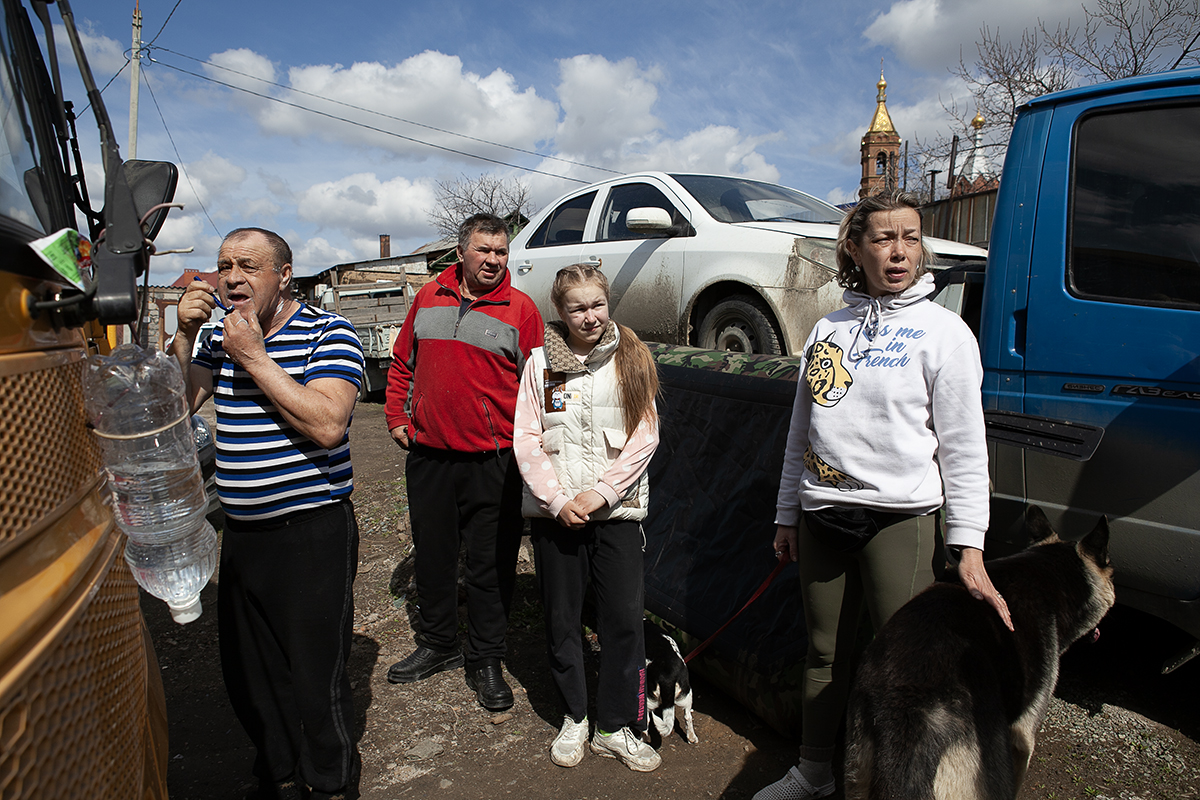 We make our way along the flooded streets. There’s a dark, wet line on the brick walls, almost as high as the roofs. The line shows how far the waters rose and how much they have already retreated. Dogs are sitting on some roofs: volunteers were unable to capture them because they were stressed and biting. So they toss them food – the animals aren’t starving. Through windows, seedlings can be seen sprouting their greenery, as if nothing special was happening; bright flecks of sunlight dance on broken glass.
We make our way along the flooded streets. There’s a dark, wet line on the brick walls, almost as high as the roofs. The line shows how far the waters rose and how much they have already retreated. Dogs are sitting on some roofs: volunteers were unable to capture them because they were stressed and biting. So they toss them food – the animals aren’t starving. Through windows, seedlings can be seen sprouting their greenery, as if nothing special was happening; bright flecks of sunlight dance on broken glass.
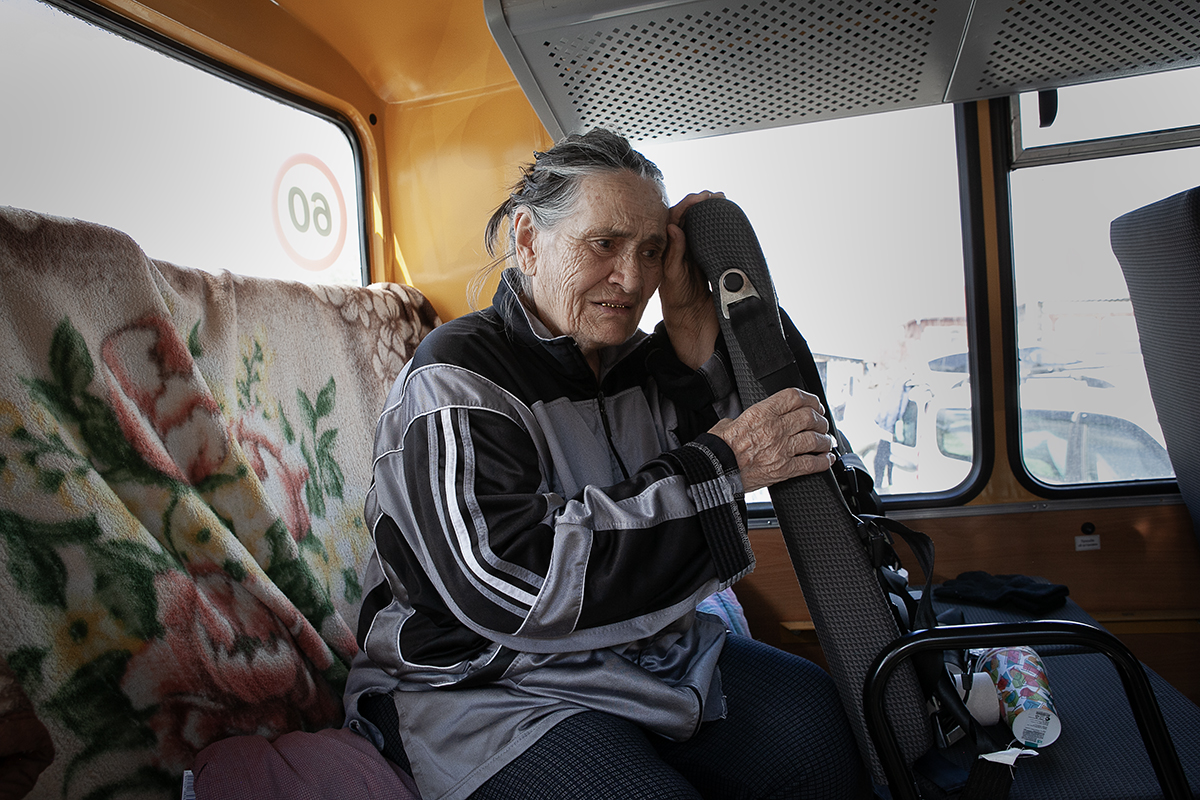
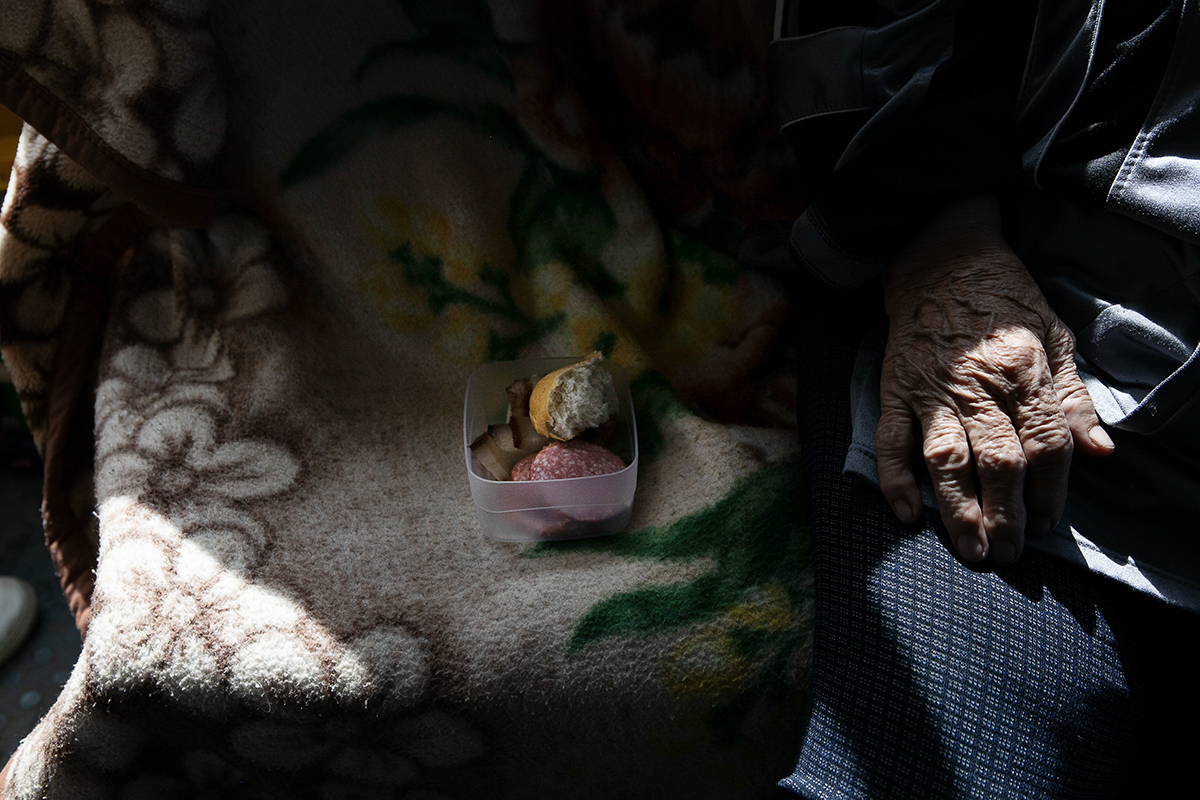 As we approach the shore I see Svetlana, a local woman, pouring tea for arriving volunteers. The Pavels already told me on the way that, when the floods began, Svetlana pulled out all her supplies and started preparing food daily, offering it for free to those who came by. The floodwaters stopped right before her small house and so it became a haven for dozens of bewildered, wet, and hungry people fleeing the water on that first, most frightening night. Galina’s family is now living with Svetlana: a grandmother, two women and a teenage girl. They have nowhere else to go.
As we approach the shore I see Svetlana, a local woman, pouring tea for arriving volunteers. The Pavels already told me on the way that, when the floods began, Svetlana pulled out all her supplies and started preparing food daily, offering it for free to those who came by. The floodwaters stopped right before her small house and so it became a haven for dozens of bewildered, wet, and hungry people fleeing the water on that first, most frightening night. Galina’s family is now living with Svetlana: a grandmother, two women and a teenage girl. They have nowhere else to go.
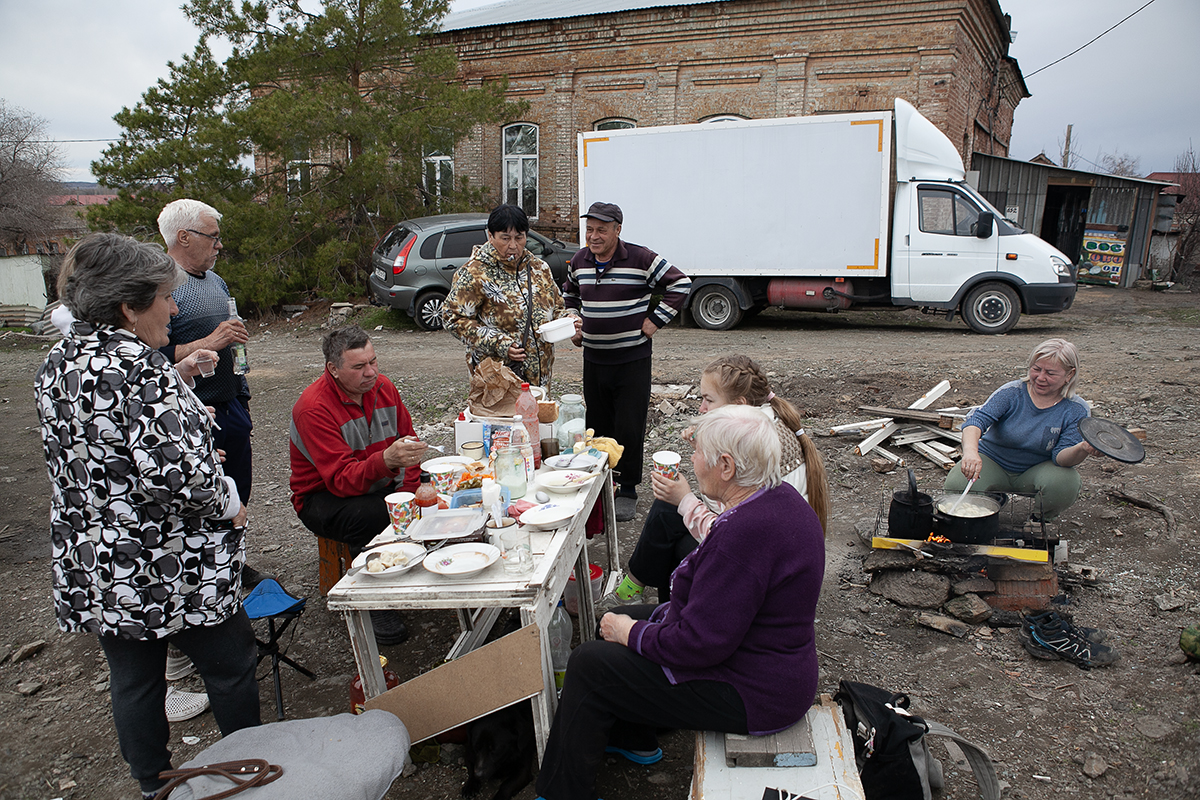 “We’re all neighbors now. No, not neighbors. Family. All of us here have become family,” say the people who’ve gathered at Svetlana’s house, laughing. It’s a shelter, a cafeteria and a transportation hub, all at once.
“We’re all neighbors now. No, not neighbors. Family. All of us here have become family,” say the people who’ve gathered at Svetlana’s house, laughing. It’s a shelter, a cafeteria and a transportation hub, all at once.
“I was rescuing a goat, right there, in the current, and flipped. A motorboat had to tow me in. In other words, I almost floated away with the goat. Basically, swimming season is open,” one of the men says.
“It’s a disaster, a total disaster,” sighs another.
“Would you like any milk?” Svetlana asks. “My husband milked a cow yesterday. She swam in on her own and lay down for a long time, couldn’t get up. We covered her with blankets and now she’s fine – she came back to life. We’ve put her in the old military recruitment office, along with the goat. Want to see?”
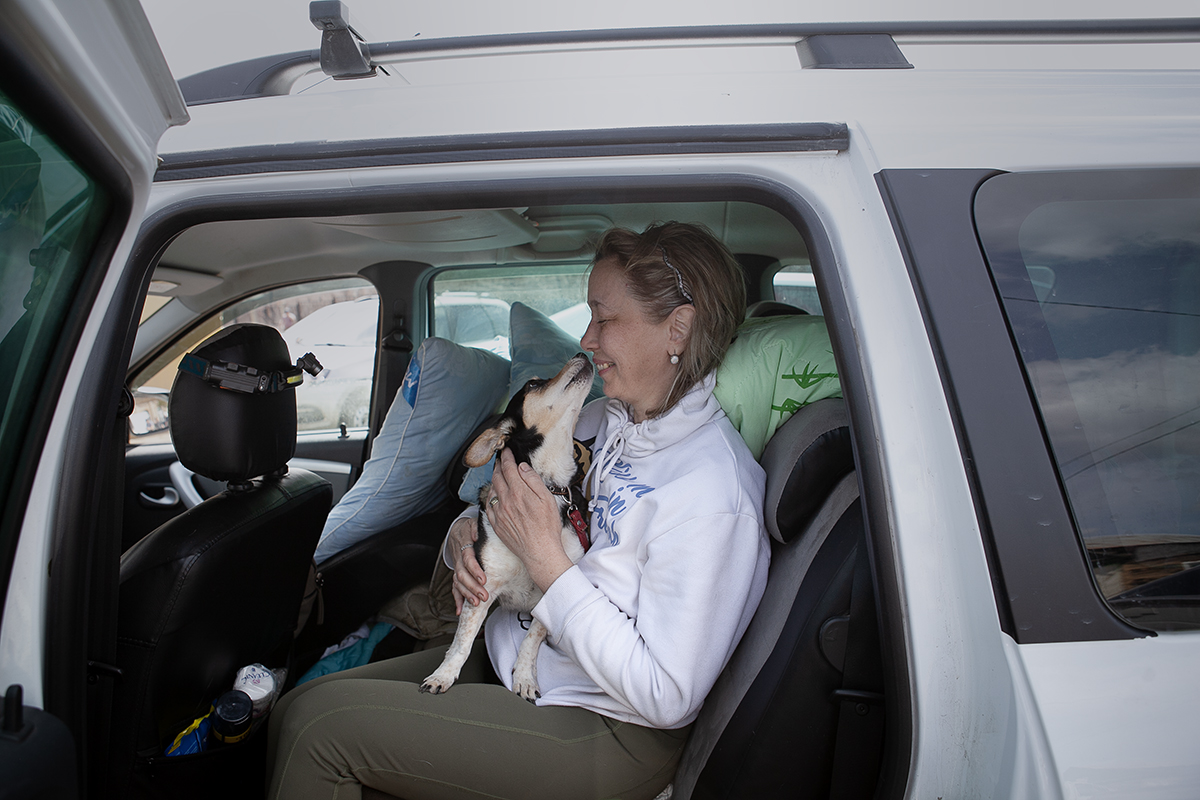 We walk up the rickety wooden steps of an empty two-storey building and I have a hard time imagining how the cow, dazed with fear, got up them. It’s cold in the damp, unheated building after being outdoors. We pass through a door with signs naming the various government offices it used to lead to and find a reddish cow with white spots. There’s straw on the ground, and a bucket filled with water. The cow stands up politely upon our arrival; she smells sweetly of milk. Svetlana explains: “The owner says they weren’t able to get her into the truck. They managed to take two, but this one was stubborn. Now we’re looking after her.”
We walk up the rickety wooden steps of an empty two-storey building and I have a hard time imagining how the cow, dazed with fear, got up them. It’s cold in the damp, unheated building after being outdoors. We pass through a door with signs naming the various government offices it used to lead to and find a reddish cow with white spots. There’s straw on the ground, and a bucket filled with water. The cow stands up politely upon our arrival; she smells sweetly of milk. Svetlana explains: “The owner says they weren’t able to get her into the truck. They managed to take two, but this one was stubborn. Now we’re looking after her.”
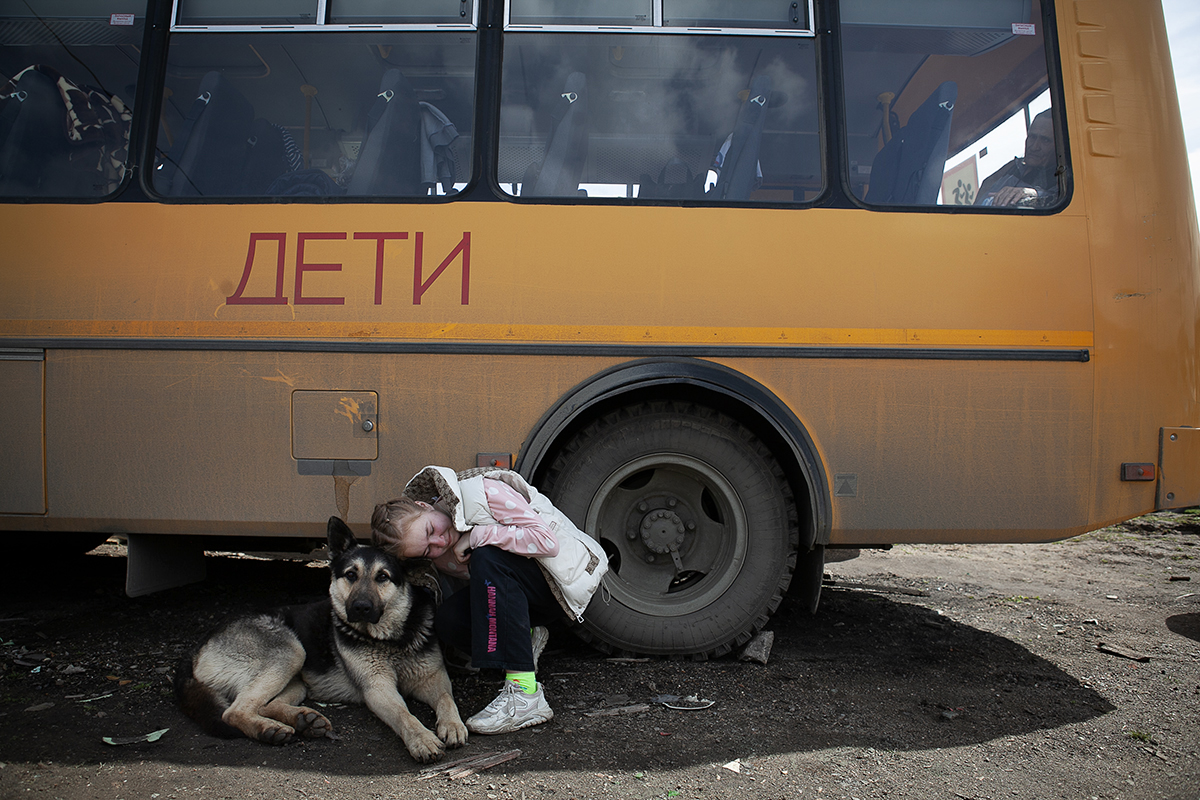 Several cars and two school buses labeled “Children” are parked in an open field behind the old military recruitment office. A man, Sergei, is shaving next to one bus in front of its cross-view mirror, using an upside-down plastic bottle as an improvised tap. He works as a driver. When the flood began, it wasn’t his property he rushed to save. Most of all he was worried about the buses, his workhorses.
Several cars and two school buses labeled “Children” are parked in an open field behind the old military recruitment office. A man, Sergei, is shaving next to one bus in front of its cross-view mirror, using an upside-down plastic bottle as an improvised tap. He works as a driver. When the flood began, it wasn’t his property he rushed to save. Most of all he was worried about the buses, his workhorses.
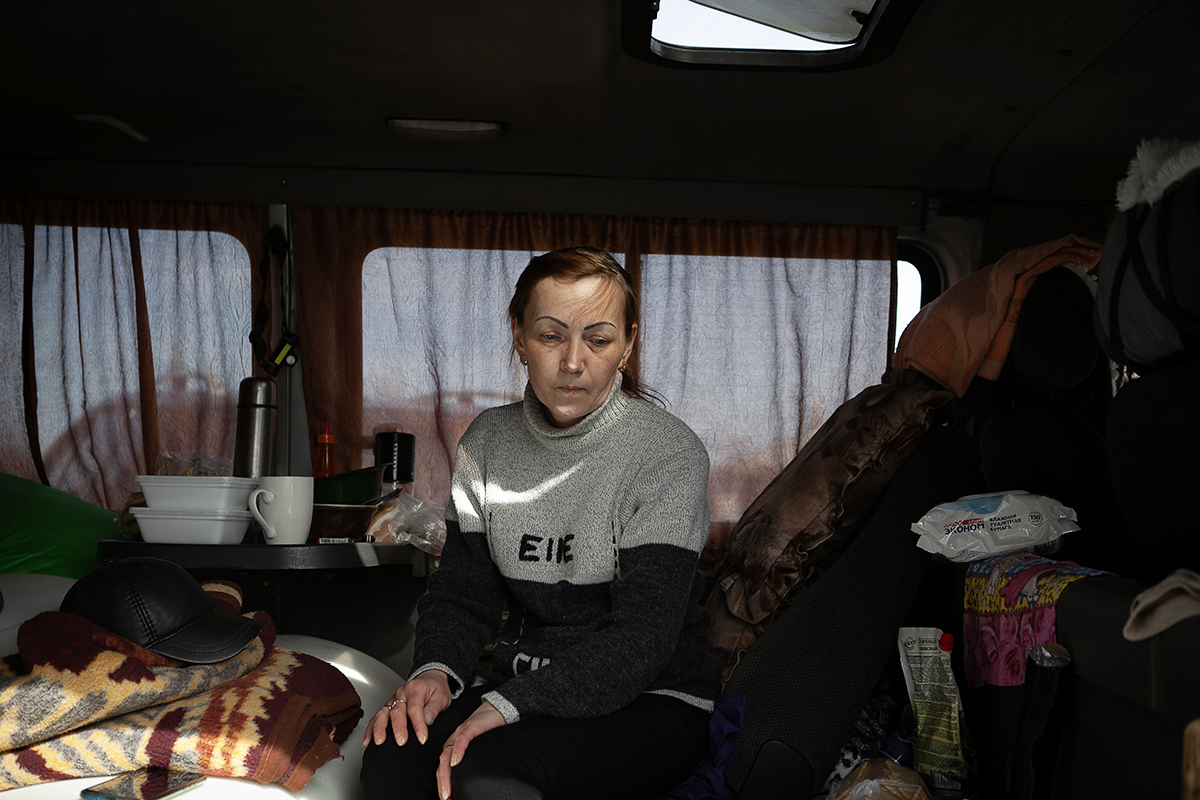 “They can’t be sealed up, and I’m responsible for them. No matter what happens, I’m the one who’ll answer for it,” Sergei explains with a smile, finishing with his shave.
“They can’t be sealed up, and I’m responsible for them. No matter what happens, I’m the one who’ll answer for it,” Sergei explains with a smile, finishing with his shave.
Sergei is 67. He was born on April 11, 1957, the year of a similar massive natural disaster.
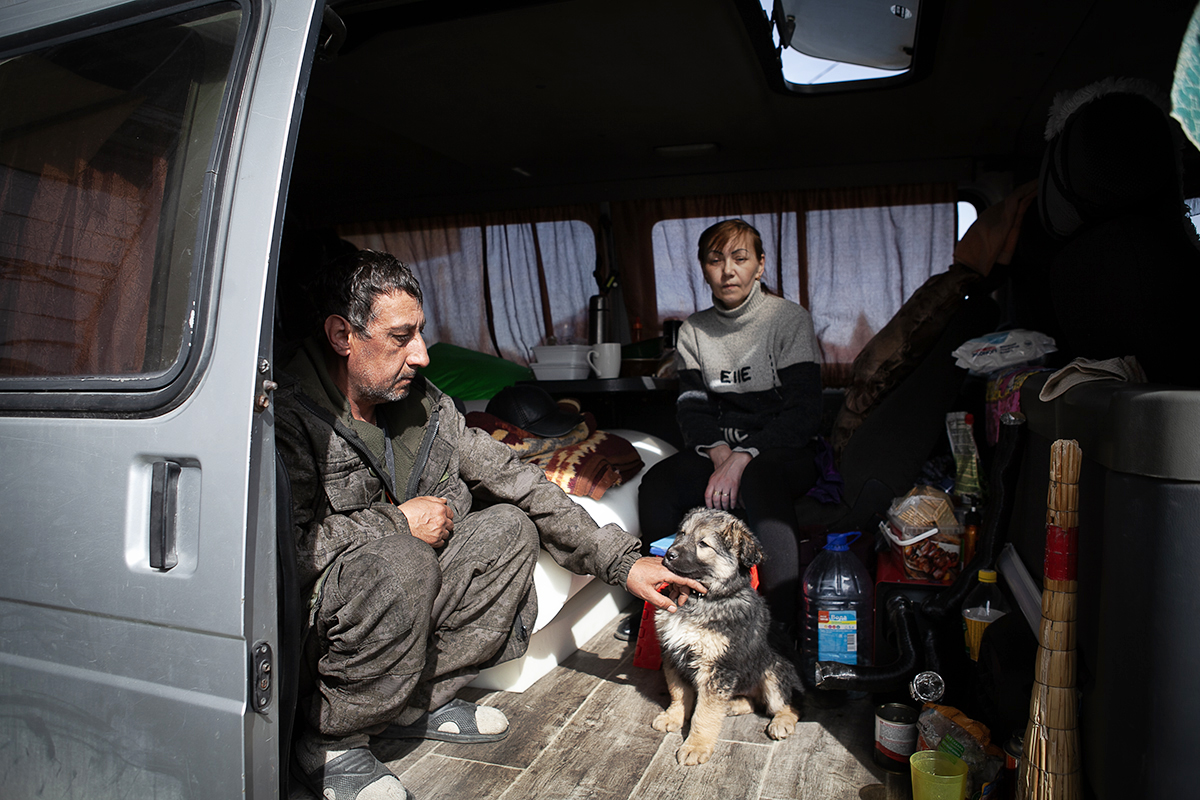 “There was a big flood,” Sergei explains. “My mother was in labor with nowhere to go. After I was born, she put me in a washbasin lined with rags and straw, put it on a table, blessed me and said, ‘If he lives through this, he’ll have a life.’ Sorry, I’m tearing up. They decided that since I was born in those conditions, I would be a sailor. And that’s how it turned out. I served on a submarine.”
“There was a big flood,” Sergei explains. “My mother was in labor with nowhere to go. After I was born, she put me in a washbasin lined with rags and straw, put it on a table, blessed me and said, ‘If he lives through this, he’ll have a life.’ Sorry, I’m tearing up. They decided that since I was born in those conditions, I would be a sailor. And that’s how it turned out. I served on a submarine.”
Sergei has been living in the bus for four days now. His wife, Marina, and her mother, Dina Petrovna, live with him. Dina Petrovna has bad legs and is unable to walk. She can lie down and sit up only with her daughter’s help.
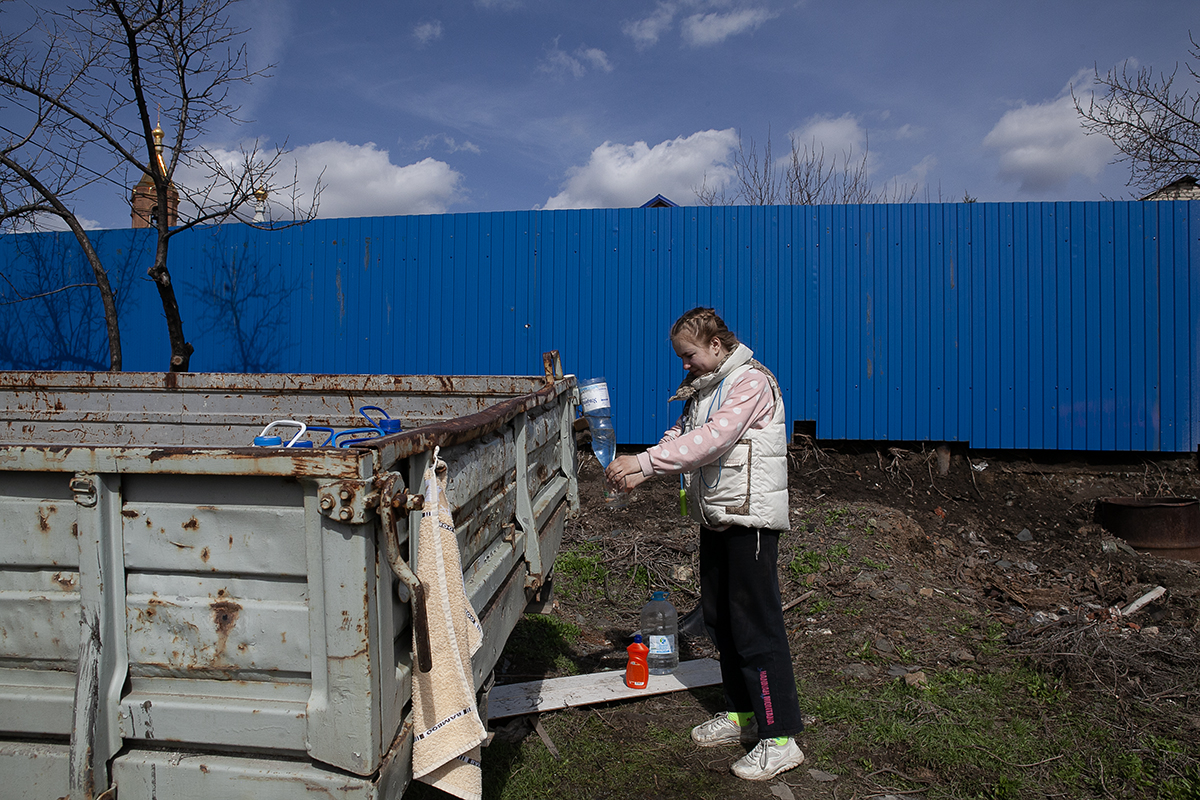
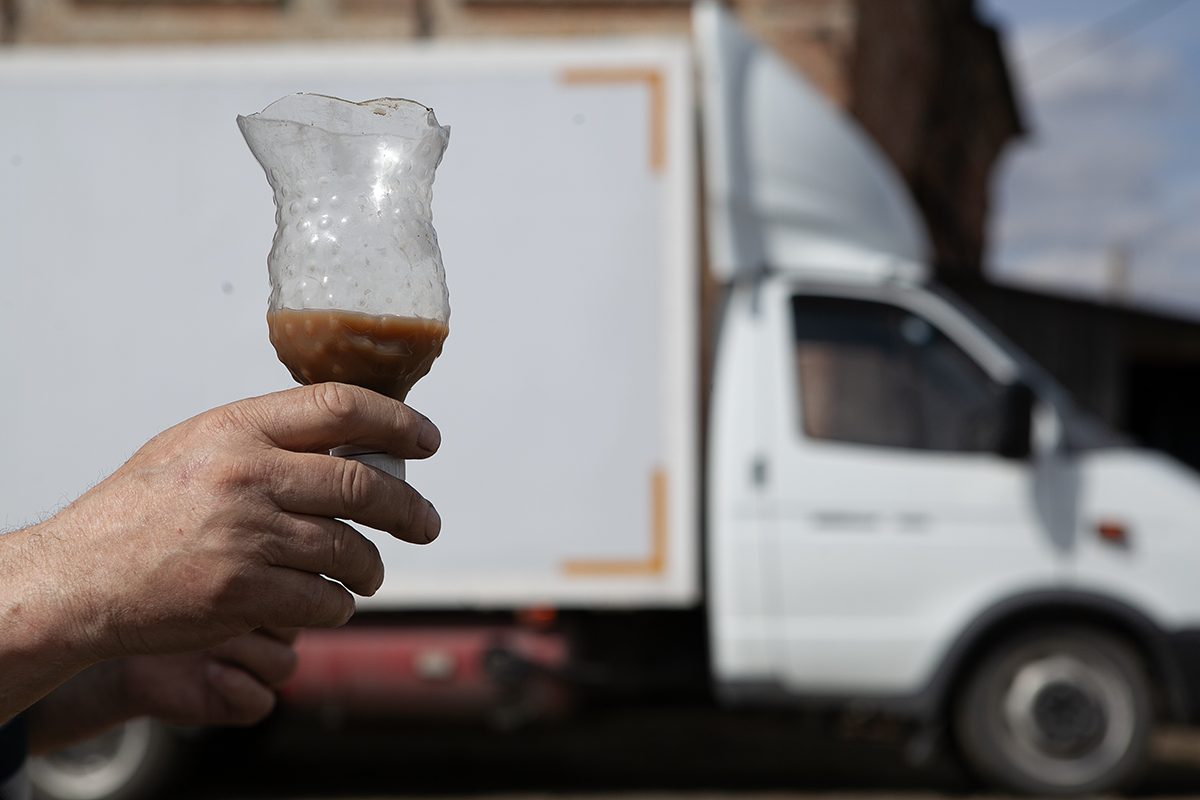 “How can a person sleep here?” Dina Petrovna asks. “You give it a try.”
“How can a person sleep here?” Dina Petrovna asks. “You give it a try.”
She throws off her blanket and shows me the seat’s hard edges. But it was already apparent to me how difficult these conditions are, especially at her age. She tells me through tears how hard she worked for her house and how much has been lost in the floods. “We have to start fresh now,” her daughter Marina agrees. “Her house was flooded right up to the roof, and the walls had been surfaced with clay. At least ours was done with cement.”
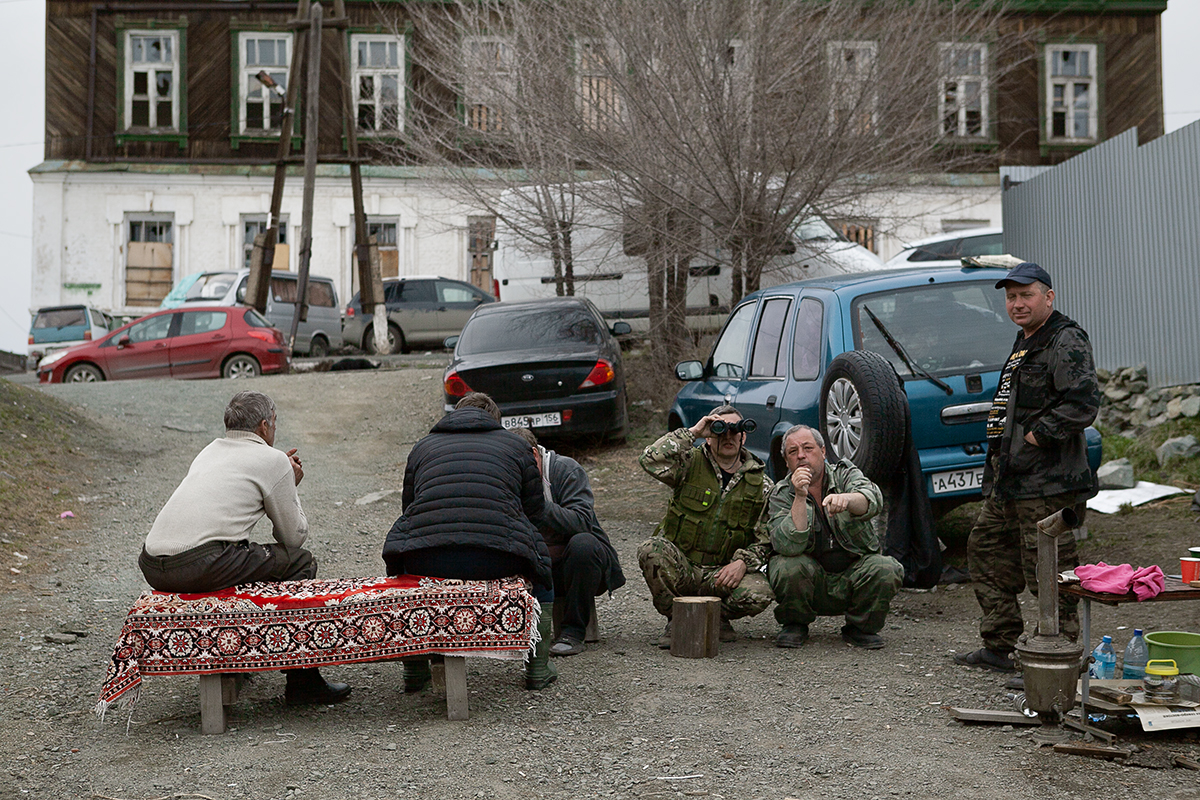 A campfire has been lit in the middle of a makeshift parking lot. The flames are rising, and a kettle is boiling on top of a metal grate. Sergei is drinking tea out of a cup made from a plastic bottle. Next to the fire are a table and benches made out of boards. A group of men and women have congregated there, with dogs rescued by locals or volunteers circling underfoot. A cheerful woman, Galina – who’s staying with Svetlana – tells stories about how locals have rescued and helped one another: “The authorities were rescuing people that first day, but then they went to a different city. The older people who were still in their attics weren’t able to get in touch with rescuers at all. So our boys helped everyone themselves.”
A campfire has been lit in the middle of a makeshift parking lot. The flames are rising, and a kettle is boiling on top of a metal grate. Sergei is drinking tea out of a cup made from a plastic bottle. Next to the fire are a table and benches made out of boards. A group of men and women have congregated there, with dogs rescued by locals or volunteers circling underfoot. A cheerful woman, Galina – who’s staying with Svetlana – tells stories about how locals have rescued and helped one another: “The authorities were rescuing people that first day, but then they went to a different city. The older people who were still in their attics weren’t able to get in touch with rescuers at all. So our boys helped everyone themselves.”
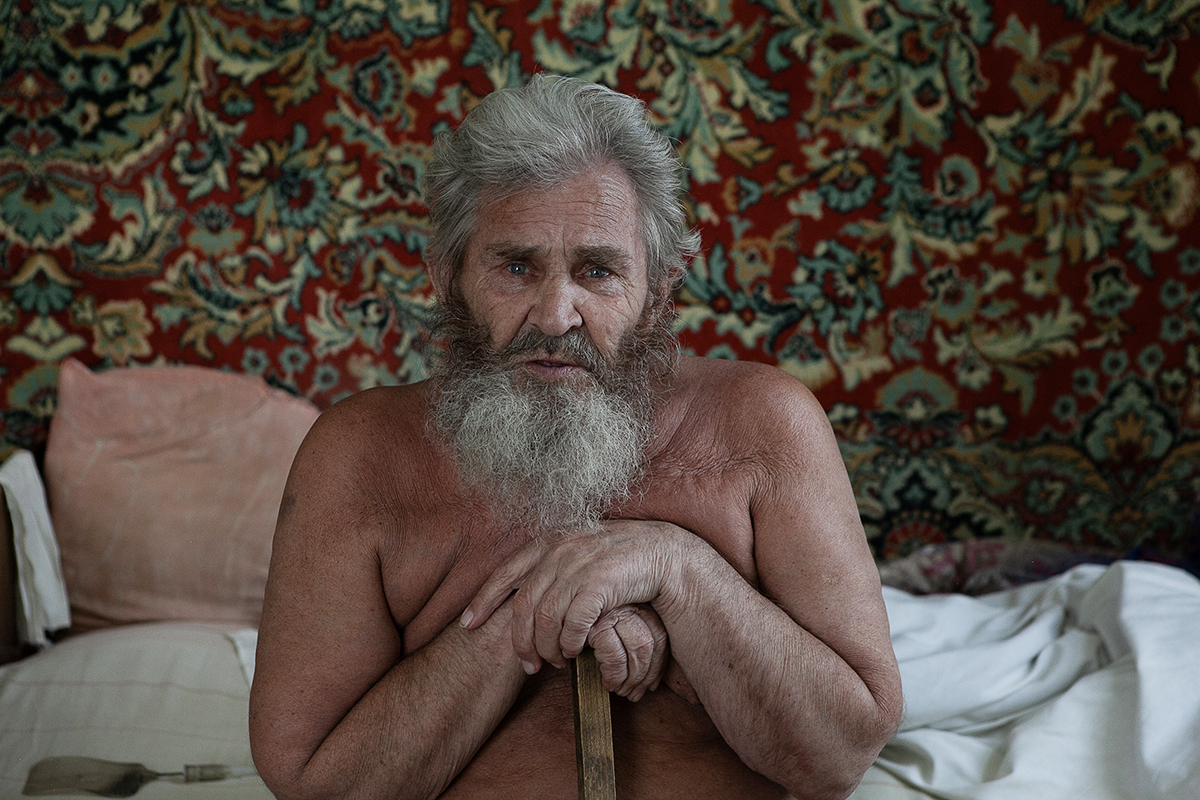 Under the warmth of the spring sun, the people at the table tell jokes and try to boost each other’s spirits as they discuss the first night of the flood. If you didn’t know they had lost almost all their possessions in the space of an hour, you’d think they’d simply gotten together for a picnic. Galina explains how they survived. “At first, we were afraid and anxious about the future. There was nothing to eat or drink, and we had no clue what to do. Then, once we’d accepted what happened, we started looking for ways out of the situation. The boys made us a table. You’ve got to live somehow. People started bringing us food. Now we’ve reached another stage. What are we going to see back at our homes? But what can you do? You’ve got to accept it and move forward. We’ve got arms and legs. We’ll get to work,” she says, repeating the phrase I’ve heard here from pretty much everyone.
Under the warmth of the spring sun, the people at the table tell jokes and try to boost each other’s spirits as they discuss the first night of the flood. If you didn’t know they had lost almost all their possessions in the space of an hour, you’d think they’d simply gotten together for a picnic. Galina explains how they survived. “At first, we were afraid and anxious about the future. There was nothing to eat or drink, and we had no clue what to do. Then, once we’d accepted what happened, we started looking for ways out of the situation. The boys made us a table. You’ve got to live somehow. People started bringing us food. Now we’ve reached another stage. What are we going to see back at our homes? But what can you do? You’ve got to accept it and move forward. We’ve got arms and legs. We’ll get to work,” she says, repeating the phrase I’ve heard here from pretty much everyone.
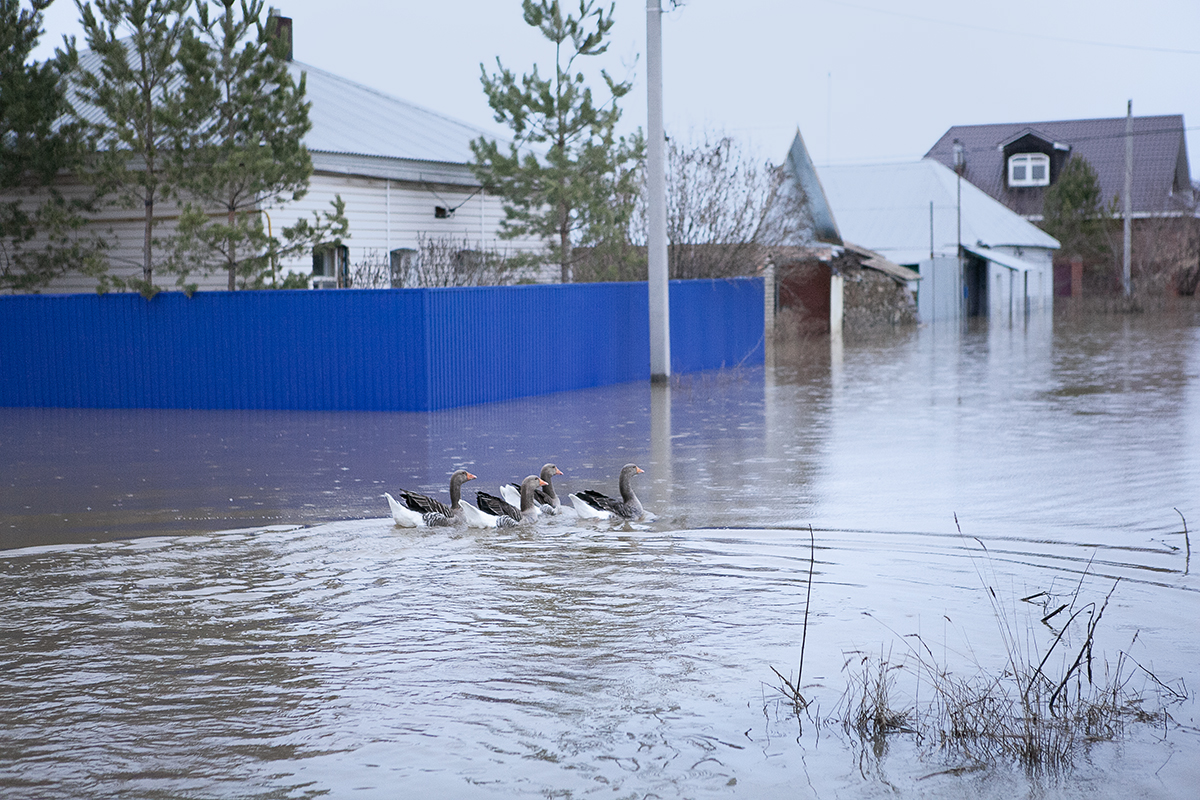 People have gotten used to being self-reliant. Marina picks up the story:
People have gotten used to being self-reliant. Marina picks up the story:
“Yeah, we’re not going to mope about it. My friend called me up:
‘Where are you?’
‘On the mountain.’
‘Which one?’
‘On Transfiguration.’
‘And what are you up to?’
‘We’re feasting on pelmeni!’
‘You’re kidding. What the hell? Are you serious?’
‘Yep, I say, and next we’re putting chicken shashlyk on the grill.’
‘You’re kidding. That’s the way to live!’
‘What about you?’
‘Well we left for Dobrovolskаyа, to the shelter. They’re feeding us, we’re sleeping on mats. We just walk around all day waiting for food, waiting for what’s next.’
‘And we’re not thinking about anything. We just finished eating, and we’re putting another pot on!’”
“Basically, we’re not letting ourselves lose heart,” Galina adds. “We’ll make do no matter what.”
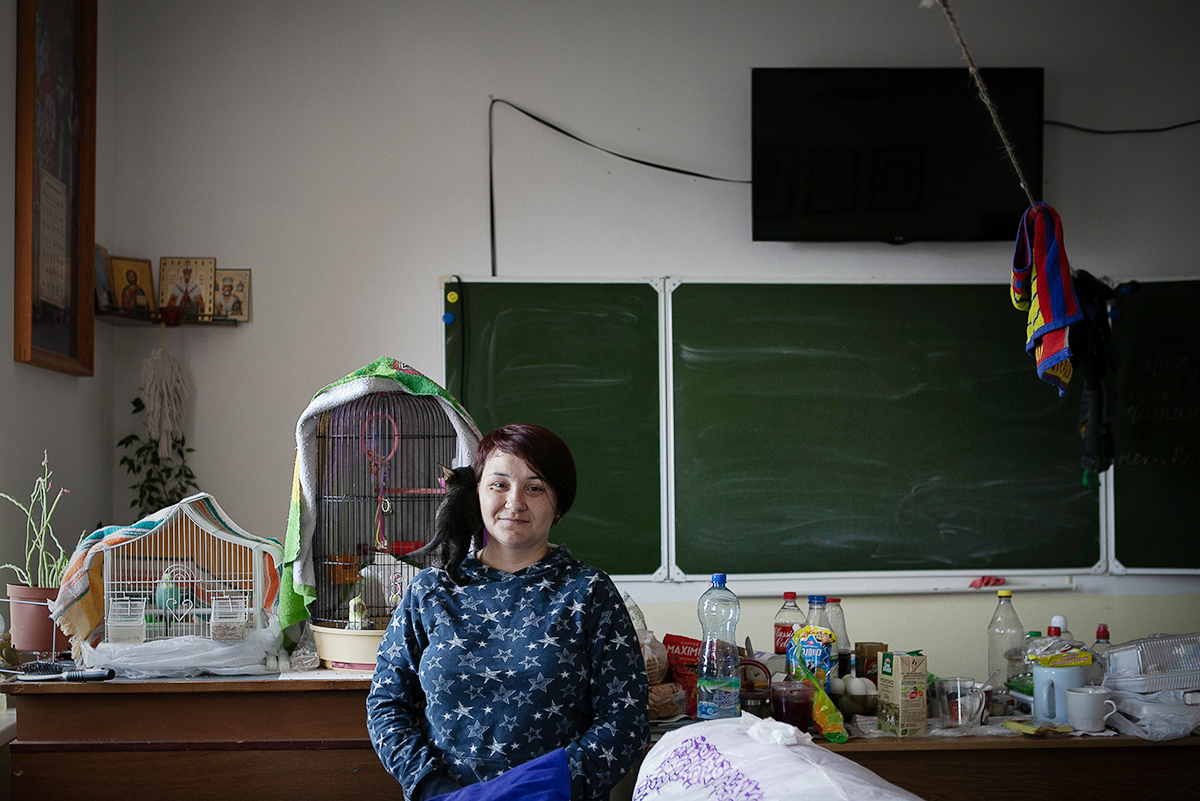 I decide to visit the Transfiguration Cathedral, where they’ve placed everyone who needed a roof over their heads in the Orthodox school that’s part of the complex. The hallway and stairwell are cluttered with boxes of humanitarian aid, which are brought in constantly by volunteers. People are having lunch in the spacious cafeteria, where I am immediately introduced to Olga Fomicheva, who coordinates both volunteers and flood victims. I ask her to show me the room she is staying in. It’s packed full of boxes and people’s personal items. There is a pair of mattresses on the floor – a small dog on one of them – as well as cats and kittens in carriers and caged parrots on the table. In one box rest fluffy white kittens, their eyes not even open. Next to them is a syringe in a cup of milk, which Olga is using to feed the orphaned felines.
I decide to visit the Transfiguration Cathedral, where they’ve placed everyone who needed a roof over their heads in the Orthodox school that’s part of the complex. The hallway and stairwell are cluttered with boxes of humanitarian aid, which are brought in constantly by volunteers. People are having lunch in the spacious cafeteria, where I am immediately introduced to Olga Fomicheva, who coordinates both volunteers and flood victims. I ask her to show me the room she is staying in. It’s packed full of boxes and people’s personal items. There is a pair of mattresses on the floor – a small dog on one of them – as well as cats and kittens in carriers and caged parrots on the table. In one box rest fluffy white kittens, their eyes not even open. Next to them is a syringe in a cup of milk, which Olga is using to feed the orphaned felines.
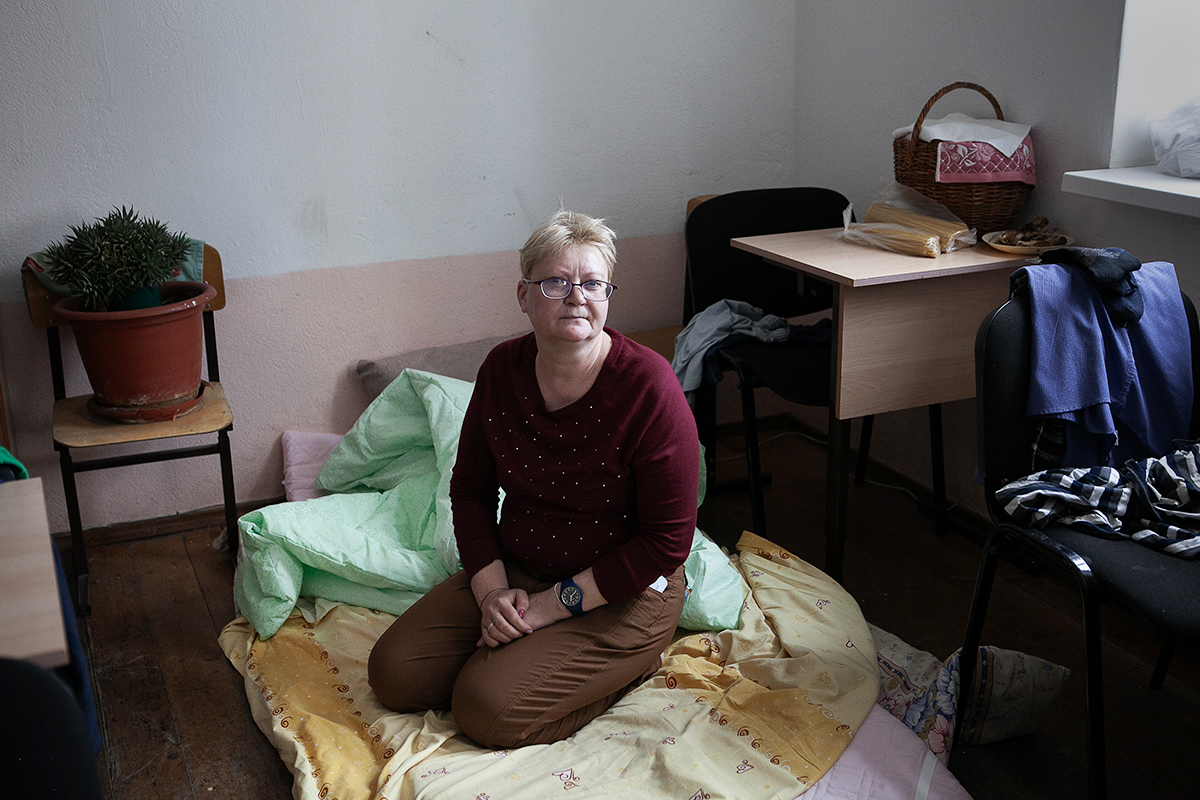 A man in camouflage pops into the room:
A man in camouflage pops into the room:
“Can I get soap, shower gel and towels to bring to some seniors?” Olga quickly gathers what he needs from the boxes.
“How did you get involved in helping people?”
“Well, we fled here ourselves with nothing but the clothes we had on. Our house flooded. People got together, organized a fire, served each other tea. If we had something dry, we would take it off and give it away. And what can you do? On the first day, we got basically nothing. By the second day volunteers had started bringing us food, water and personal hygiene products. I was the one everyone was coming to, so it just turned out this way.”
Another woman, also Olga, who is sorting the boxes of humanitarian aid brought by volunteers, explains:
“I have a daughter who’s disabled – she’s developmentally delayed both mentally and in terms of speech. I help here and she sits in our room upstairs. I check on her throughout the day. We’ve got mattresses now that they brought us – at first we were just sleeping on the floor. The only thing is, I don’t know what’s going to happen with my job. My boss has told me – and he’s serious – that I have to go to work. He says, ‘Evacuate out of there and come live close to work.’ As if it’s that simple.”
“What are you living on right now?”
“On whatever people offer.”
I go back outside. Evening is falling and it’s starting to drizzle. I need to find a way to get back to the “mainland.” I approach my new acquaintances next to the old military recruitment office. They’ve all taken shelter from the rain in a school bus.
“What? Are you really going to leave?” they ask, worried. “Better stay here. Tomorrow is Sergei’s birthday, we’re going to celebrate. We’ll set the table, we’ve saved a jar of pickles, we’ll make a salad.”
I promise that if I don’t leave, then of course I’ll happily take part. Then I say goodbye and walk off to find a boat. The rescued cow watches me as I walk away, wistfully chewing grass. They brought her outside and her life is gradually returning to normal.
What Comes Next
On April 14, Governor Pasler announced that at least two commissions would be working to assess damages from the flood and that 600 to 650 houses had already been inspected.
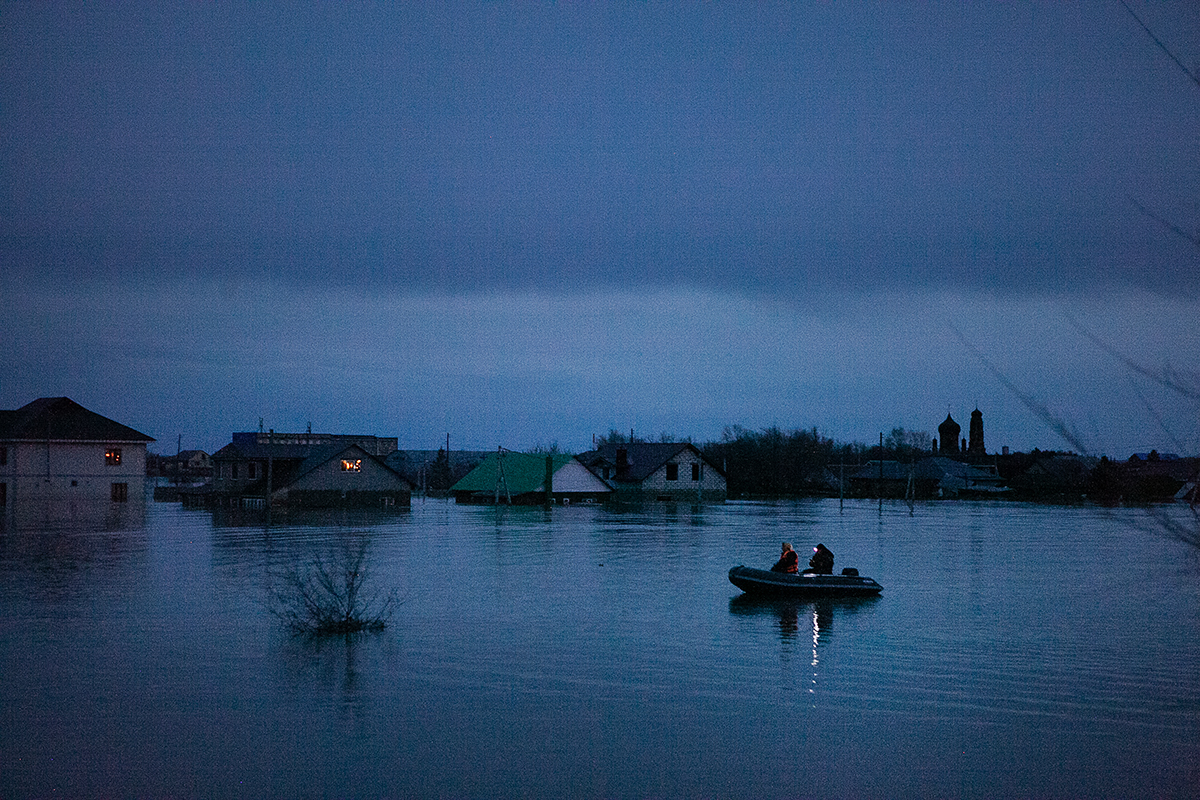
POSTSCRIPT
In early July, two and half months after the flood, Orsk Mayor Vasily Kozupitsya resigned. Townsfolk organized protests in April and demanded his ouster. They felt that work done to repair damages wrought by the flood on over 6000 households was insufficient. Those in Orsk who lost their homes and possessions in the flood are still waiting for compensation from the authorities.
Minister of Emergency Situations Alexander Kurenkov announced that the payments would be increased by 50 percent. That translates to R15,000 ($170) in general compensation, R75,000 ($850) for partial loss of possessions, and R150,000 ($1,700) for a property that is a total loss. The rescued animals were temporarily housed in nearby Novotroitsk, in a private facility hastily organized by local residents.
Volunteers are still requesting a permanent location to house the animals, but have not received a decision.
В материале используются ссылки на публикации соцсетей Instagram и Facebook, а также упоминаются их названия. Эти веб-ресурсы принадлежат компании Meta Platforms Inc. — она признана в России экстремистской организацией и запрещена.
Every day we write about the most pressing social problems in our country. Based on our experience, we are certain it is feasible to address and deal with them only by reporting the real state of affairs. This is why our team travels across the regions, takes interviews, talks to people and experts, does photo reportages to sportlight and document people’s lives and stories. We collect money for charity organisations without any commission on our part.
Our media exists due to donations. We hope you can consider subscribing for a monthly donation to support our project. Any help is valuable, especially if it is set on a regular basis. Any sum from you is an opportunity for us to plan our work.
Please, sign up to donate and sustain our media and cause.
Donate